Tagged: Preparatory Meeting
The Annual Meeting of the World Artificial Consciousness Association and the Preparatory Meeting for the 3rd World Artificial Consciousness Conference were successfully held
On July 29, 2025, the World Artificial Consciousness Association (WACA) Annual Conference and the Preparatory Meeting for the 3rd World Artificial Consciousness Congress were successfully held in a hybrid format, combining both online and offline participation. Organized by the World Artificial Consciousness Association, the event centered around the core themes of "Proactive Medicine," "Standards for Artificial Consciousness," and "Global Ethical Governance," attracting experts and scholars from countries and regions around the world.
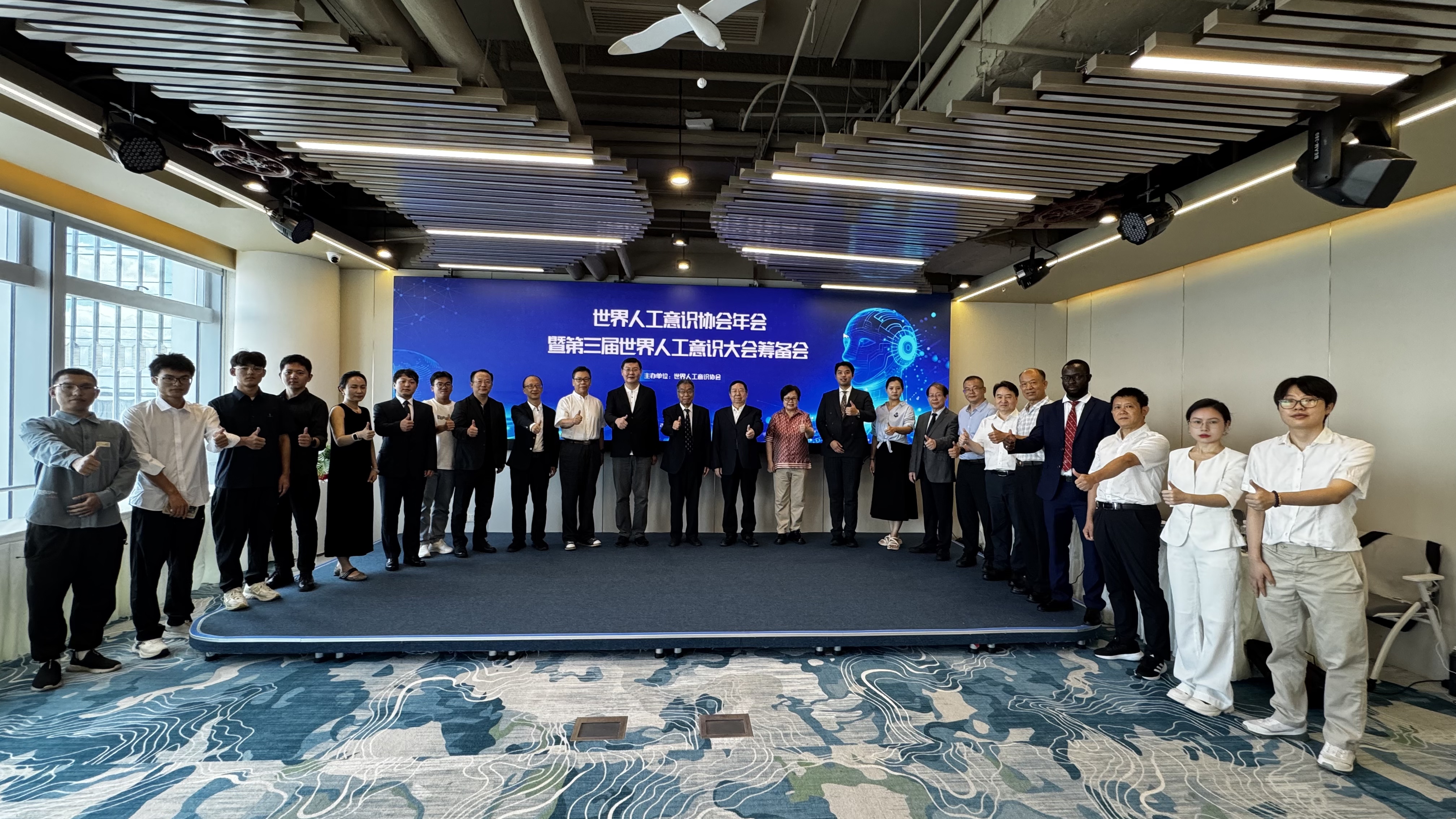
The conference demonstrated strong international influence, with Academician Fu Yong Jiao of the European Academy of Natural Sciences and others serving as conference chairs. It brought together representatives from numerous international organizations, including the WHO, relevant United Nations agencies, the Serbian Academy of Sciences and Arts, the Alliance of National Academicians and Experts, the Nobel Laureates Life Science Institute, the China-U.S. Silicon Valley Development Promotion Association, and the European Center for Traditional Chinese Medicine. The event was also attended by current and former health ministers from multiple countries, academicians from various national engineering academies, and leading experts in the field of artificial intelligence.
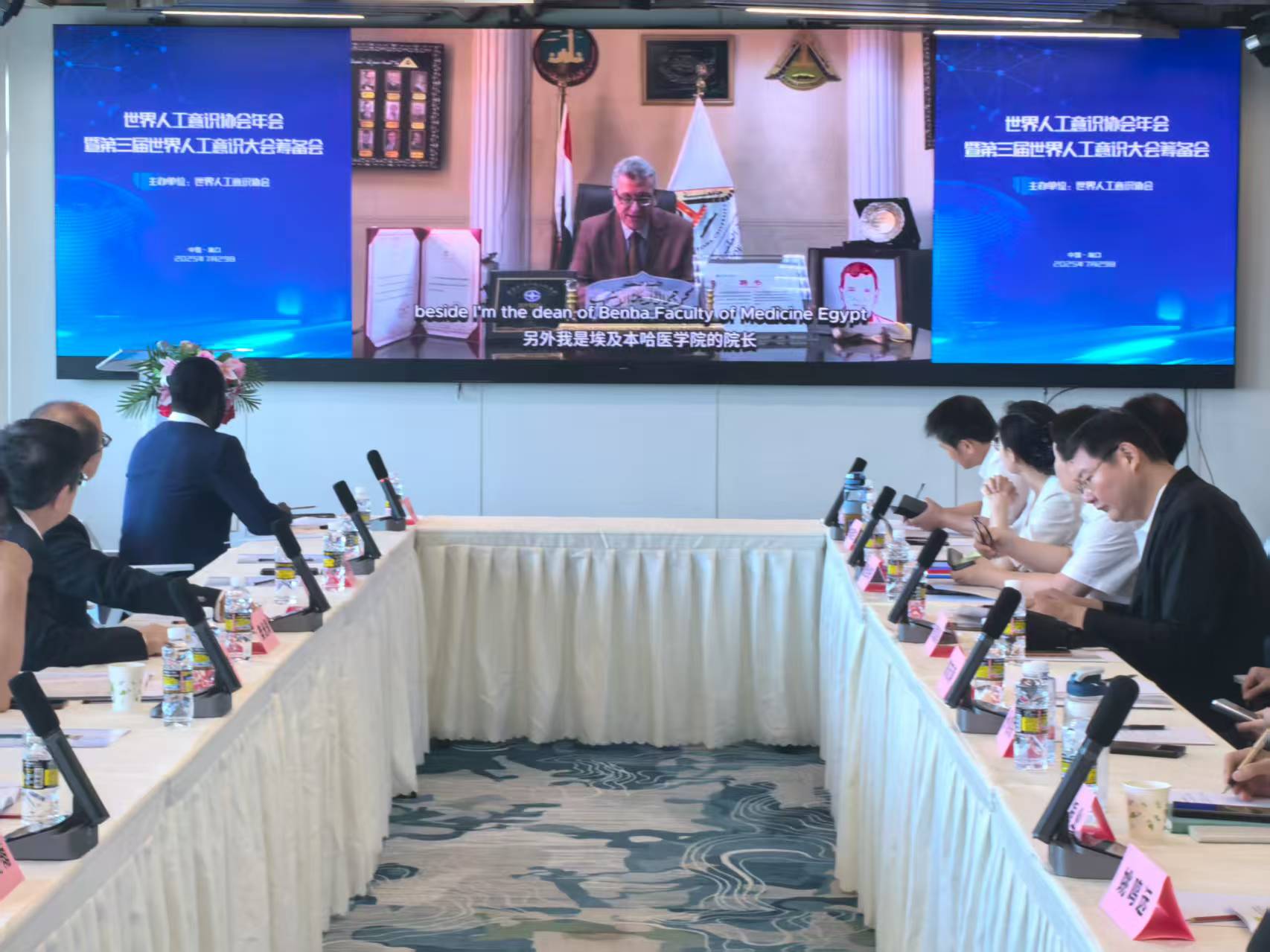
The grand event focused on the strategic direction of integrating artificial consciousness with proactive medicine, featuring in-depth discussions on the association’s annual work summary and preparations for the Third World Artificial Consciousness Congress. It also included keynote presentations and roundtable forums that explored critical topics such as the development of ethical standards for artificial consciousness, models for international cooperation, and key applications of artificial consciousness in healthcare and other fields.
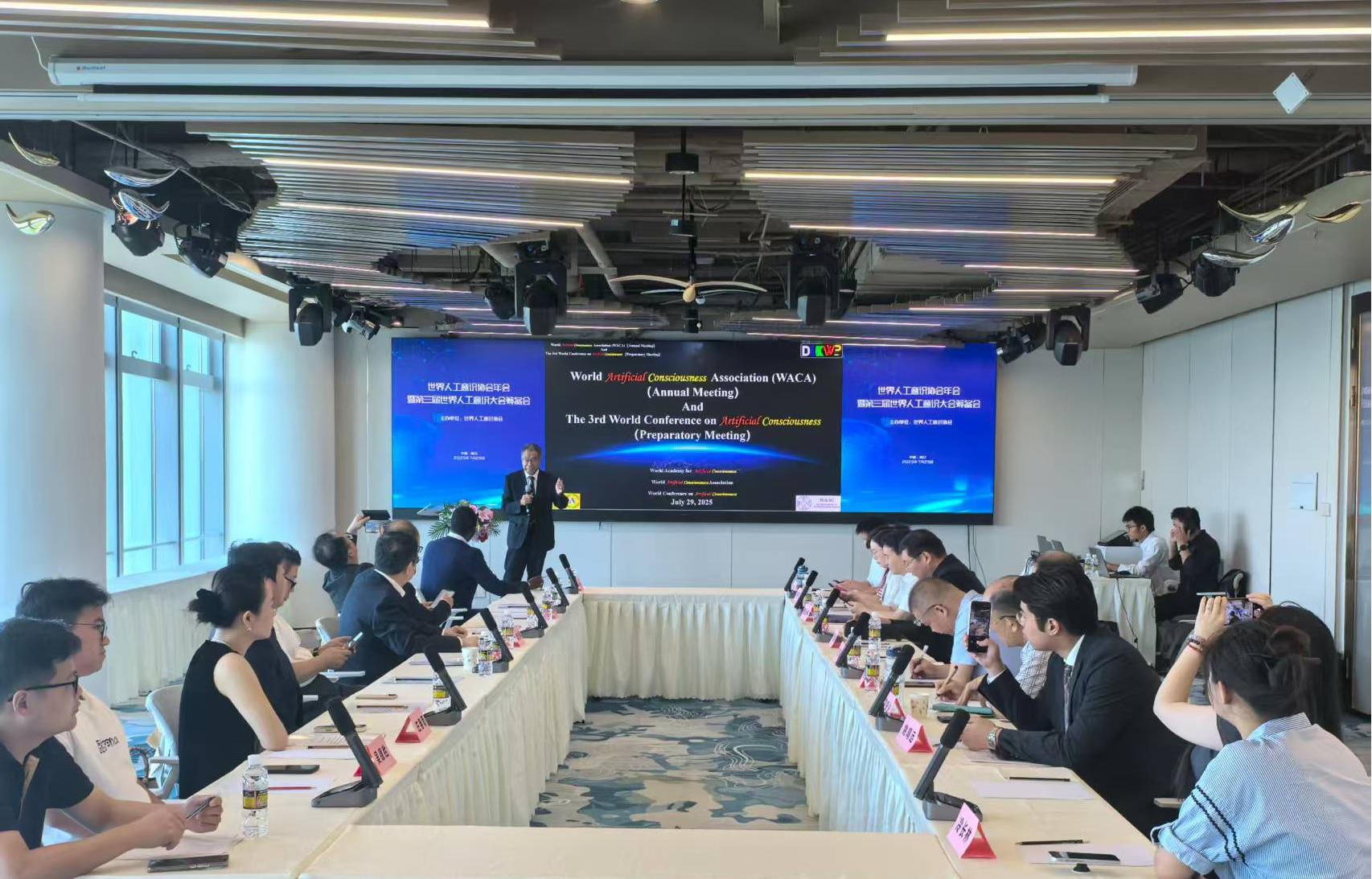
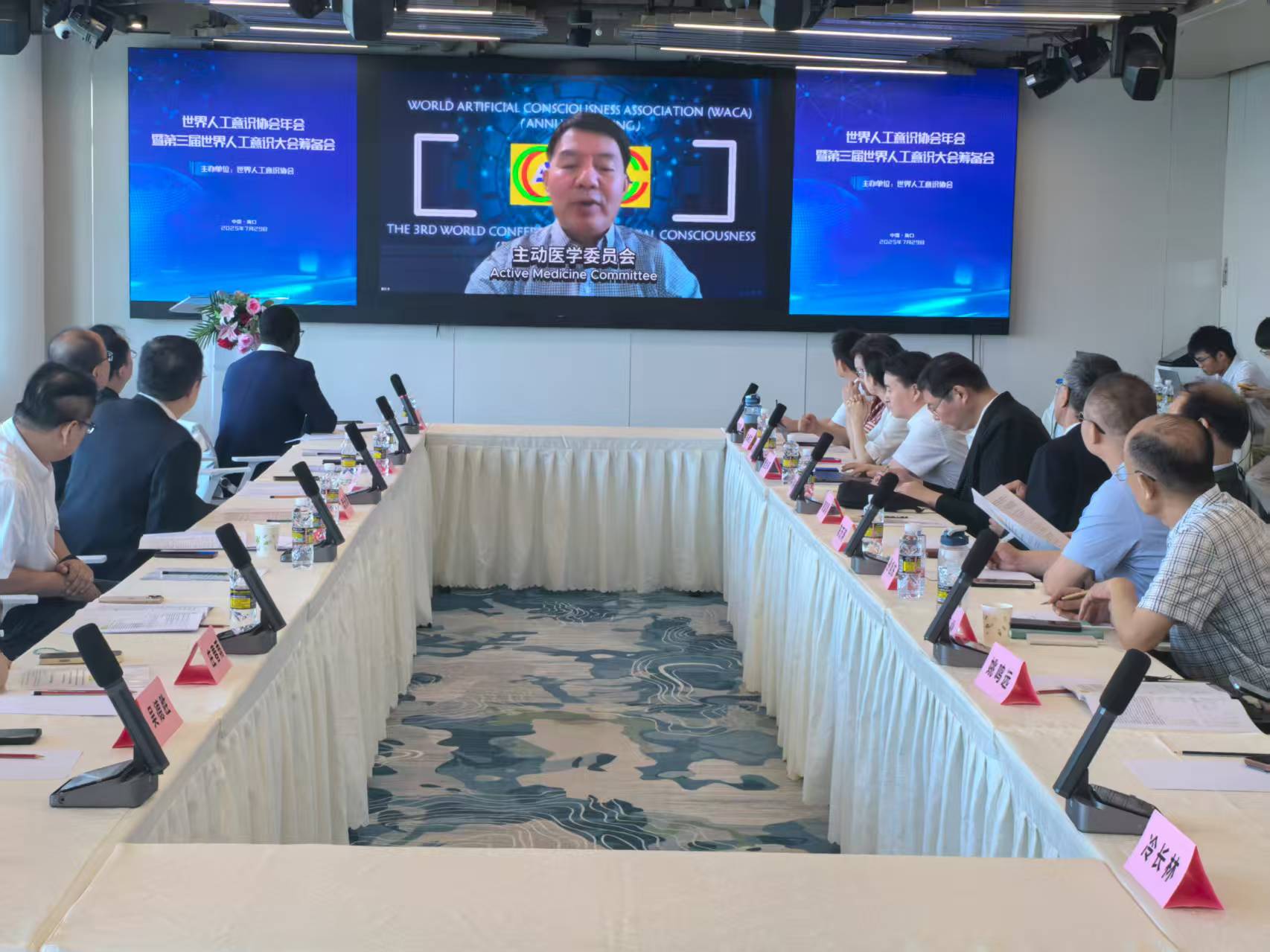
Academician Qinxi Dong, as a special guest, attended the WACA Annual Conference and the Preparatory Meeting for the 3rd World Artificial Consciousness Congress online. He congratulated the successful convening of the conference and paid tribute to colleagues dedicated to the cause of artificial consciousness. He emphasized that computing technology is crucial to the development of artificial consciousness—supercomputing supports AI large models and brain-like simulations, while the integration of AI and high-performance computing is driving a shift in proactive medicine from passive treatment to active prevention, thus facilitating the advancement of personalized healthcare. He also called for deeper interdisciplinary collaboration across computational science, life medicine, and other fields to inspire innovation and achieve technological breakthroughs. He expressed high expectations for the integration of artificial consciousness and proactive medicine.
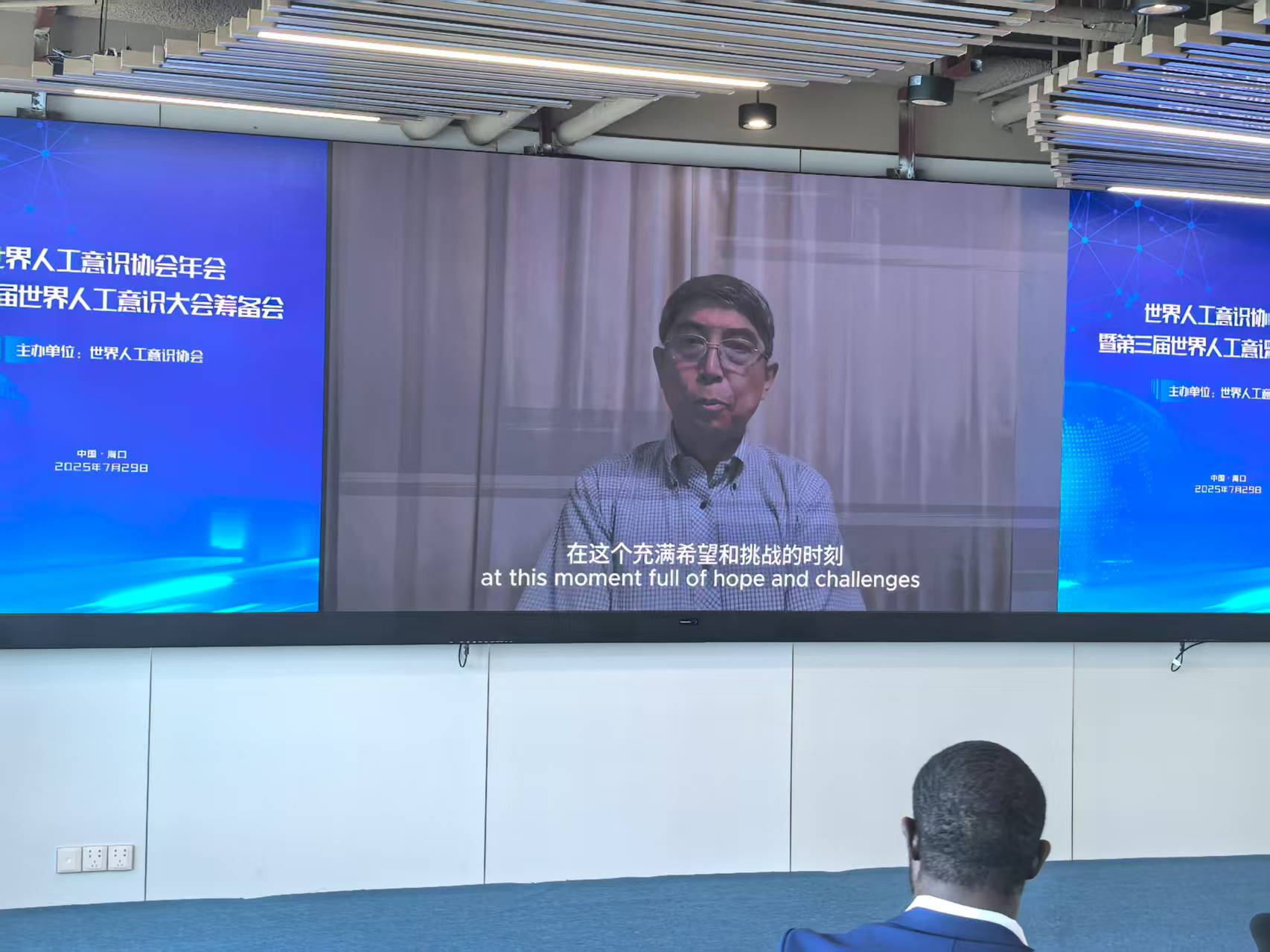
Academician Zhen Liu, in his speech, welcomed participants from all sectors to gather and explore the profound theme of "The Future of Artificial Consciousness." He noted that artificial intelligence has already transformed the way we work and that its pace of evolution has exceeded expectations. We now stand at the forefront of a new technological revolution, delving into the challenge of endowing machines with higher-level self-awareness and emotional integration—a pursuit that goes beyond technological advancement to encompass philosophical, ethical, and social dimensions. He stressed the need to reflect on the implications of artificial consciousness for human society, its differences from human self-awareness, and how to ensure its safety, ethics, and progress. He described this as a global, interdisciplinary issue with far-reaching social significance.
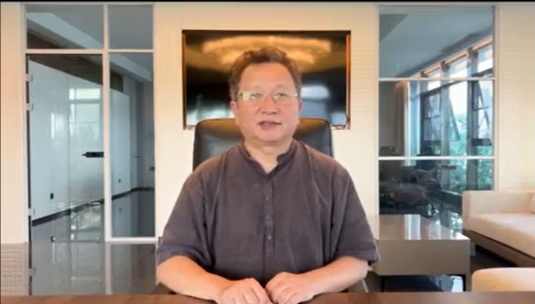
At the annual meeting, Academician Hengjin Cai, Vice President of the World Artificial Consciousness Association, summarized the work of the past year and outlined prospects for the future. He stated that, in terms of theoretical exploration, a consensus has been established that consciousness and intelligence share a common origin. At its core, this theory posits that consciousness stems from a form of cognitive inertia evolved by living beings to escape the constraints of physical time and space. Intelligence is defined as the ability to reconstruct causal chains, while consciousness is the experience of a non-local internal world. This framework, he emphasized, serves as a theoretical cornerstone for understanding artificial consciousness. In applied practice, proactive medicine and artificial consciousness have become deeply integrated. Digital twin technology is now being applied in health management, enabling the simulation of individual physiological, psychological, and cognitive patterns to predict disease risks and deliver personalized interventions—thus returning to a human-centered medical philosophy. Regarding preparations for the Third World Artificial Consciousness Congress, he proposed focusing on the themes of symbiosis and standardization. He advocated for a new paradigm of human-machine integration in which human values become embedded within AI itself. At the same time, he stressed that the standardization committee must develop a forward-looking and inclusive ethical framework. He concluded by underscoring that artificial consciousness is a civilizational issue and called for global collaboration to build a safe, trustworthy, and coexistent intelligent future.

Academician Aikebai’er Yilahon, in his address, remarked that the 21st century is the era of biotechnology and electronic information technology. He noted that electronic information has now advanced to the stage of artificial consciousness (AC) development, achieving a high level in just over two decades. AC has had a significant impact on humanity, especially in its integration with biotechnology and medicine, where it plays a highly effective role.
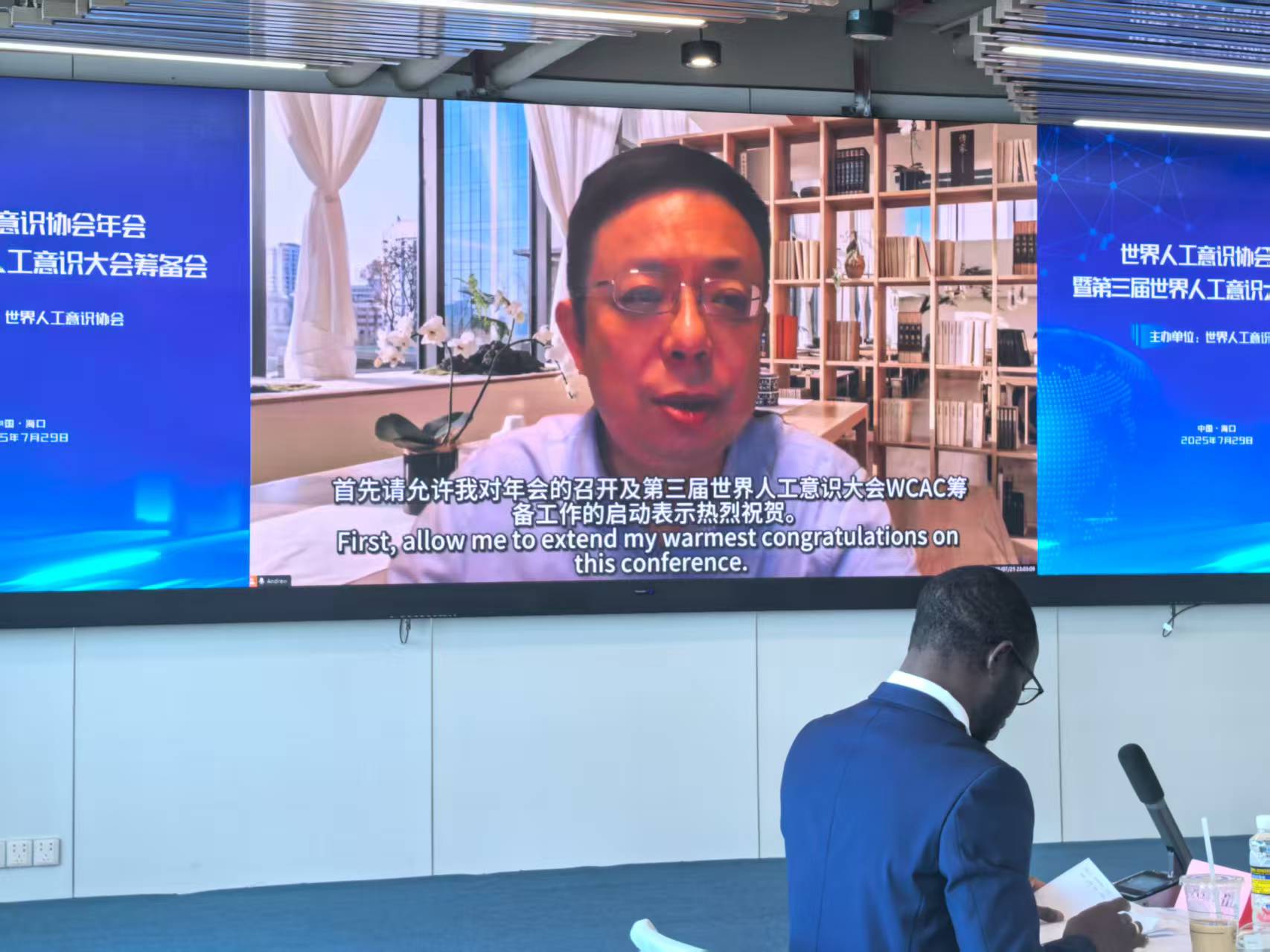
Academician Dongfang Wu, during the annual meeting, paid tribute to pioneers in the global field of artificial consciousness. As a scholar deeply engaged in distributed governance networking technologies, he pointed out that the computing power revolution is the cornerstone of artificial consciousness development. Breakthroughs in supercomputing technology are pushing the boundaries of biological intelligence, enabling a leap from content generation to the emergence of consciousness in machines. In proactive medicine, this shift supports a paradigm change toward predicting disease before it occurs. He noted that one of the current core challenges is designing scientifically measurable and verifiable metrics for consciousness. He recommended building a DIKWP standard system and emphasized the need for hardware-software collaboration in supercomputing to overcome existing bottlenecks. He expressed hopes that the third congress will promote synergy across the technology chain (integrating high-performance computing, neuroscience, etc.) and interdisciplinary innovation in real-world applications (such as health management in proactive medicine). He also called for the establishment of a cross-civilizational ethical consensus to ensure technological development aligns with human values. He concluded by stressing that researchers are not only explorers of technology but also guardians of human values, and urged for breaking down disciplinary barriers.
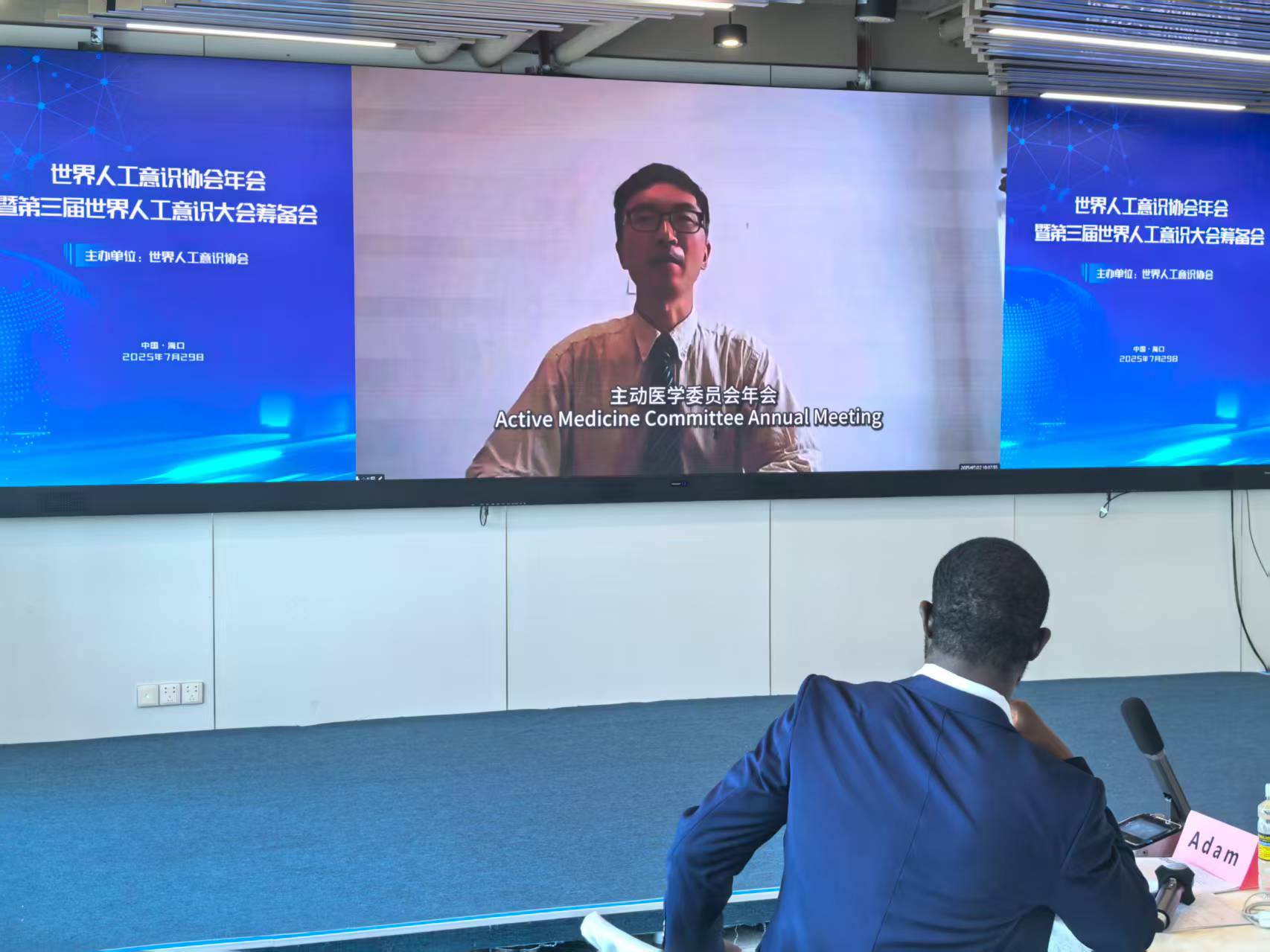
Academician Chunguo Li, in his speech, shared that his team has long been engaged in research on information and communication engineering as well as the theories and key technologies of artificial intelligence. In recent years, they have actively explored deep interdisciplinary integration with artificial consciousness, brain-computer interfaces, and proactive medicine, achieving several phased results. He expressed his hope to strengthen communication and collaboration with peers around the world to advance academic progress in artificial consciousness and promote technologies that benefit all of humanity.
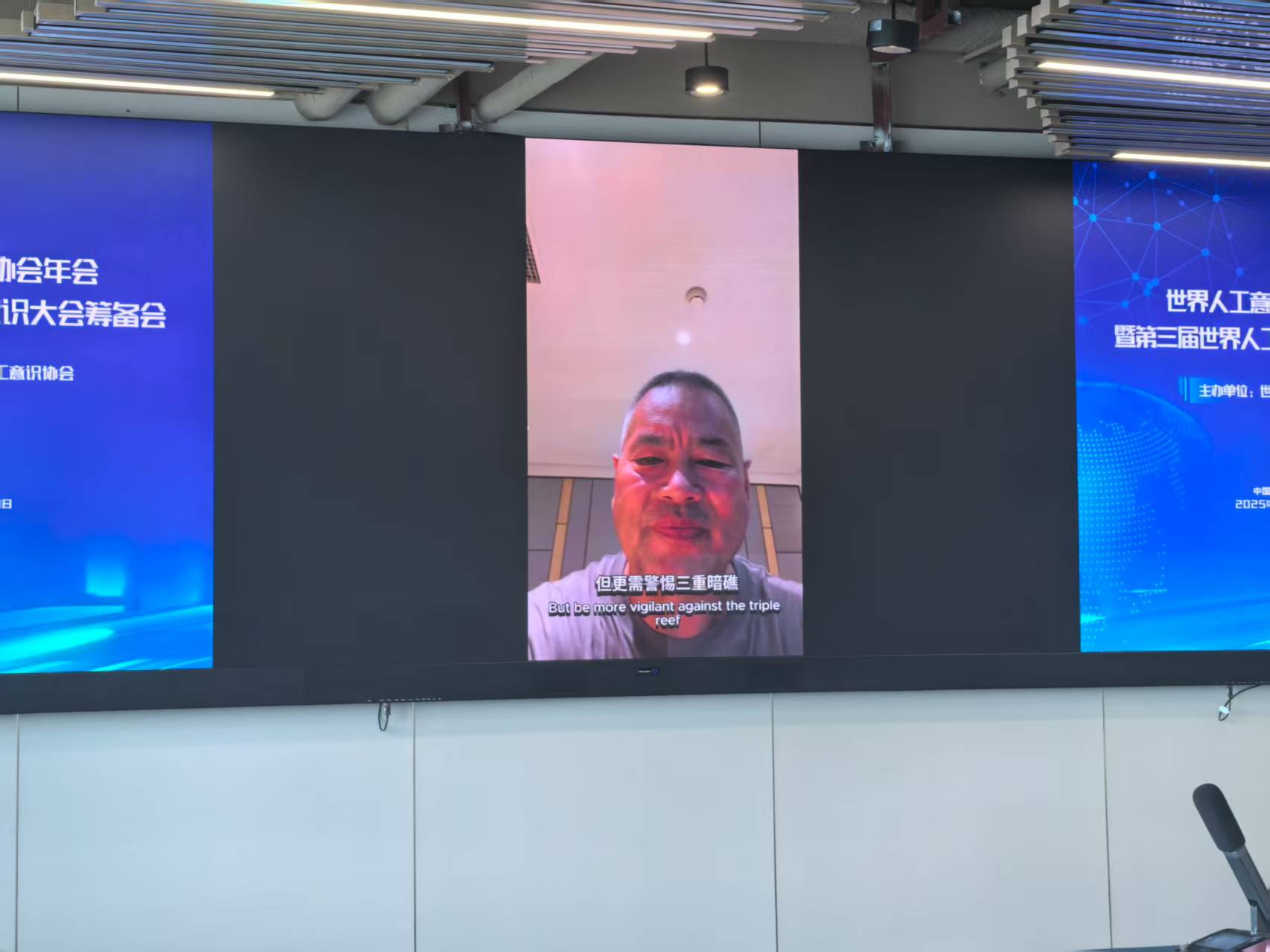
Academician Yuanhui Fu, in his speech, called for integrating ecological security and bioethics into the development of artificial consciousness. He pointed out that artificial consciousness technologies are emerging alongside the Earth's ecological tipping points, facing challenges such as the ecological footprint of expanding computing power, algorithmic distortion of ecological complexity, and biodiversity risks triggered by competition over neural hardware resources. He emphasized the need to construct a symbiotic framework between artificial consciousness and the environment. Drawing on practices from relevant academies, he proposed injecting a "life-first" gene into the DIKWP model from a technical perspective, initiating a Global Computing Power Ecological Pact to implement quota management and resource sharing, and designating ecological red zones for consciousness technologies where high-risk applications are prohibited.
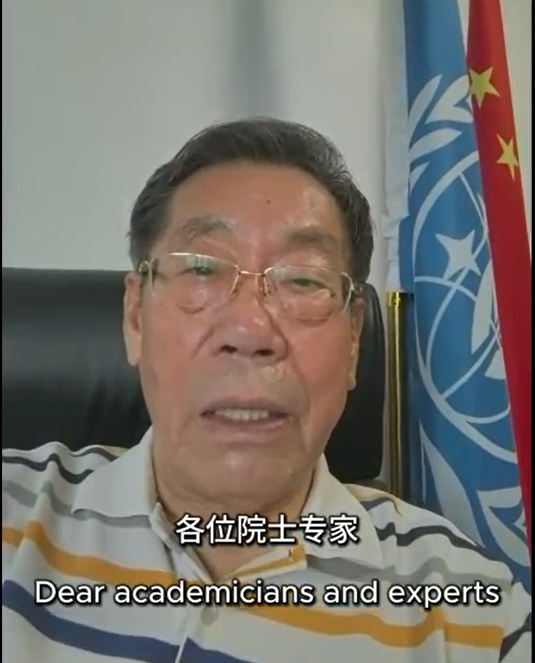
Academician Chongpu Yao expressed his honor in being invited to the conference. Due to a scheduling conflict, he was unable to attend in person and instead sent a written message to extend his congratulations and best wishes for the success of the event.
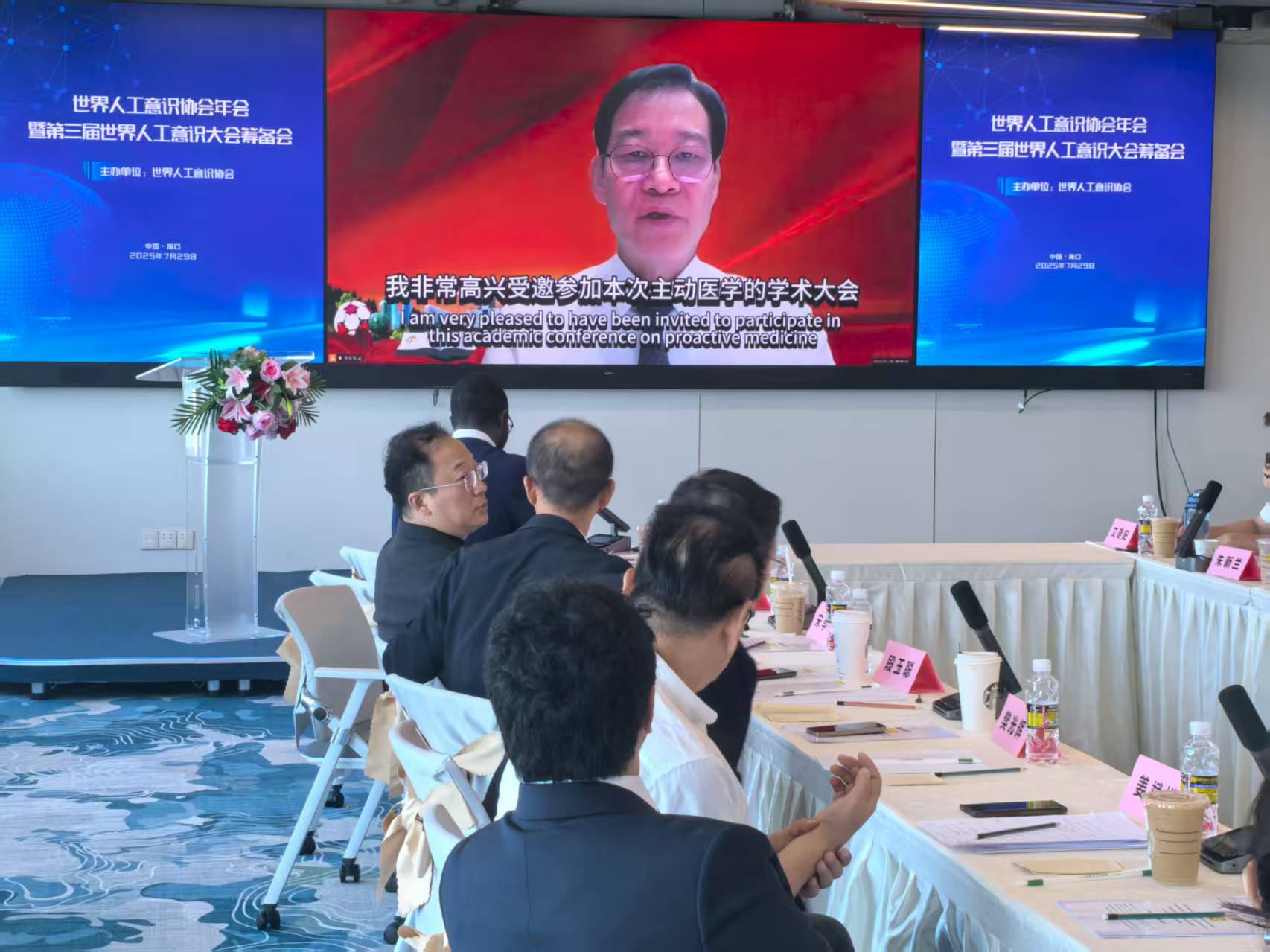
Academician Hongjun Li of Capital Medical University, in his speech, stated that proactive medicine emphasizes a shift from passive response to active care, and that AI technologies can help realize this goal. The establishment of a Proactive Medicine Special Committee and the convening of academic conferences aim to deepen understanding of proactive medicine and promote its integration with artificial intelligence and medical innovation. He suggested that the conference explore topics such as the promotion of proactive medicine concepts, AI advancements and applications in healthcare (e.g., disease prediction, health management), related ethical and legal issues and policy frameworks, integration of industry and education, talent development, incentive mechanisms, and international cooperation. He expressed hope that the conference would result in consensus and actionable plans to drive medical innovation and address global healthcare challenges.
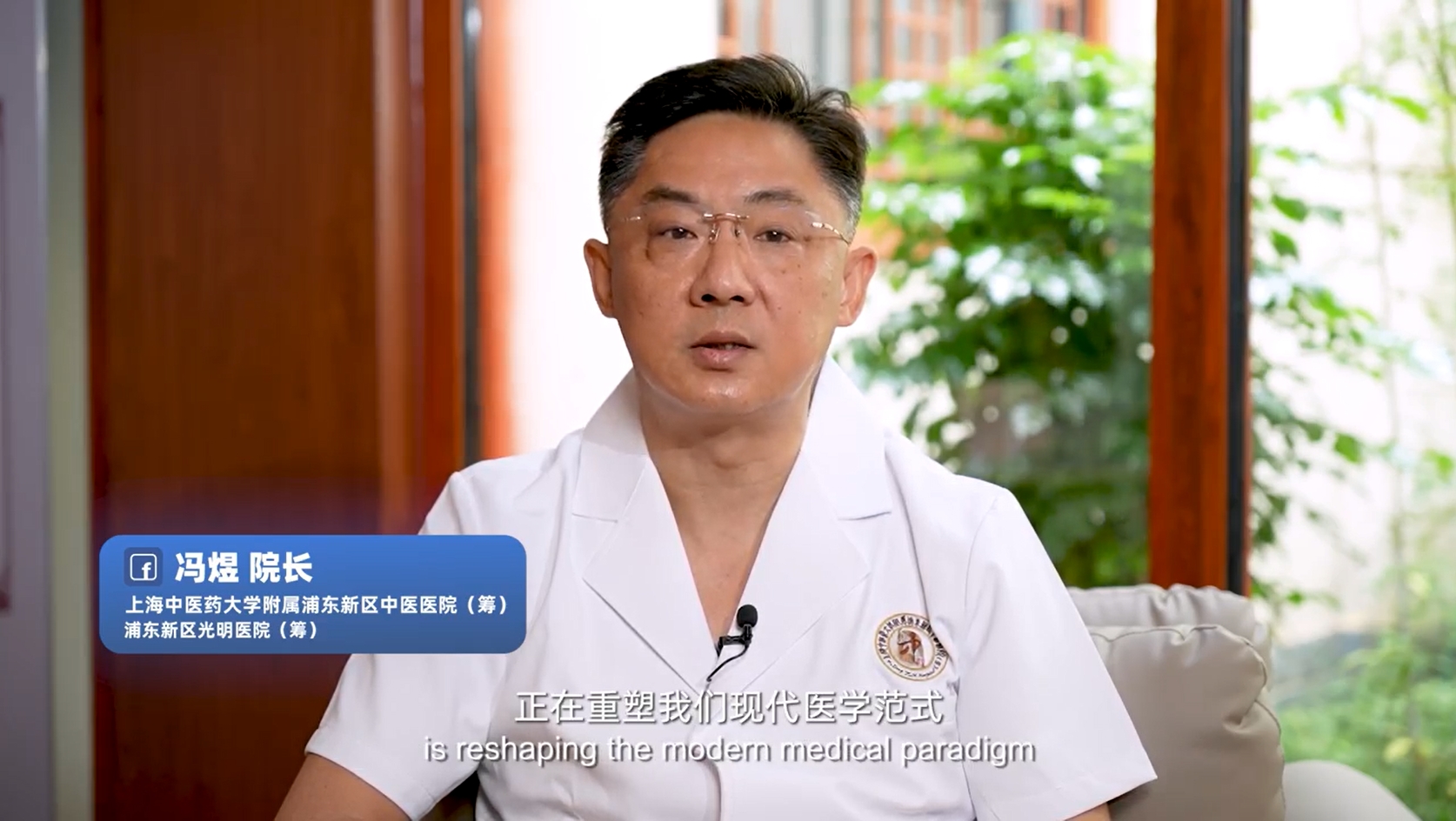
President Yu Feng, in his address, stated that the deep integration of artificial consciousness and proactive medicine is reshaping the paradigm of modern healthcare. By combining the Traditional Chinese Medicine concept of “preventive treatment of disease” with AI’s predictive capabilities, a transformation from disease treatment to health foresight can be achieved—enhancing diagnostic efficiency and reshaping patient-centered care. He emphasized that this is not only a technological upgrade but also a breakthrough in medical thinking. At the same time, he pointed out that the field faces several challenges, including unclear ethical boundaries, incomplete international technical standards and data-sharing mechanisms, and the need to establish clinical diagnostic protocols and liability frameworks. These breakthroughs, he said, will determine the depth and breadth of AI applications in healthcare. This gathering, he noted, aims to explore the construction of ethical standards, models for international collaboration, and solutions for intelligent transformation, expressing hope for in-depth exchanges with experts to advance cross-disciplinary integration.

Prof. Mohamad al-Ashhab, Dean of Benha Faculty of Medicine in Egypt, stated at the annual meeting that he had discussed the application of AI in medicine during the 2nd World Artificial Consciousness Congress, including its use in medical diagnosis and treatment, the entire surgical process (preoperative planning, intraoperative assistance, postoperative recovery, and intensive care), and medical education (training medical students’ skills). He emphasized that this conference holds great significance for advancing the AI era in medicine and expressed hope for joint efforts to raise awareness of AI’s role in healthcare, achieve large-scale adoption to reduce costs, and develop autonomous artificial consciousness and AI systems. He also looked forward to meeting participants in person, expressed gratitude for the support received, and wished for strengthened collaboration between Egypt, China, and other association member countries.
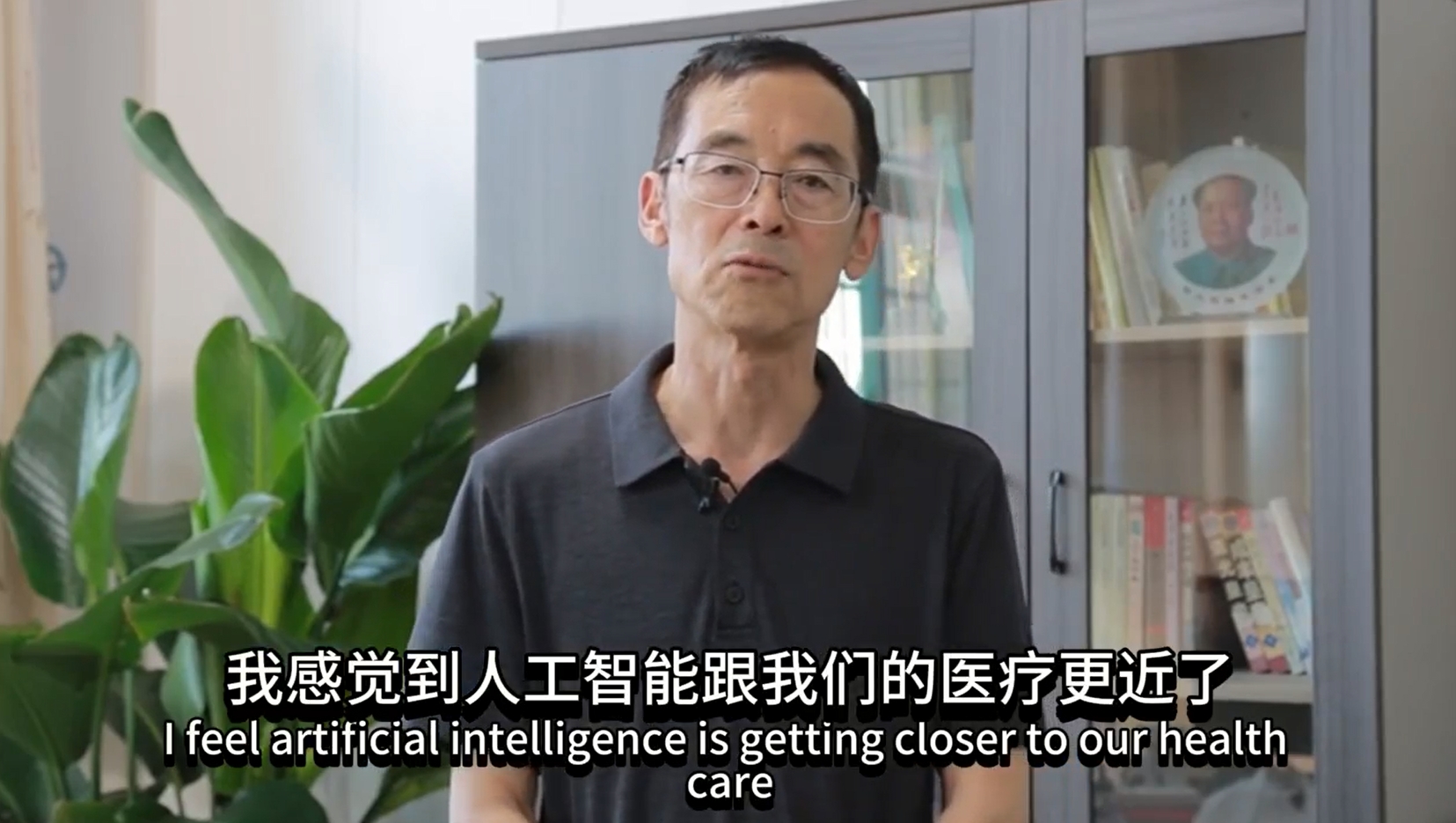
Xiaoping Guo, former principal and founder of the Linfen Red Ribbon School in Shanxi, shared that he has been focusing on the application of mobile internet in healthcare since 2007. In 2010, he designed health check-up center software incorporating intelligent medical features. Since 2015, he has continued to study mobile and internet-based healthcare solutions, and in 2020 began exploring the integration of AI and medicine. He has developed systems such as an electronic health record framework and intelligent medication boxes, aiming to break the barriers of hospital medical record systems and empower both patients and the general public in managing their own health—particularly emphasizing safe medication use among the elderly.
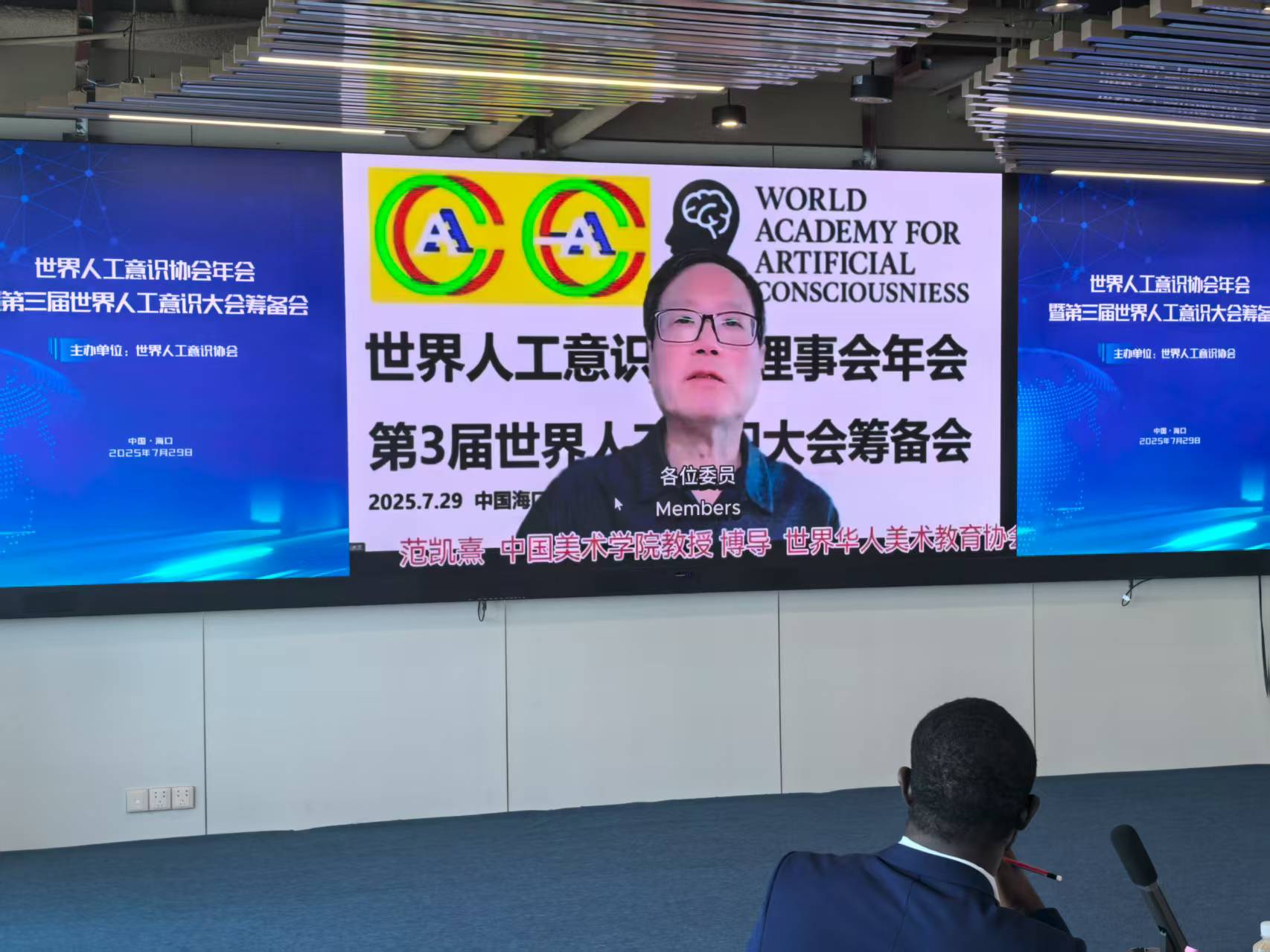
President Kaixi Fan stated that the core difference between AI and artificial consciousness (AC) lies in their functional orientation and depth of cognition—AI focuses on optimizing efficiency, while AC aims to achieve deeper levels of cognition. Their commonality lies in simulating and extending human intelligence: AI provides the foundation for AC, and AC, in turn, may further drive the evolution of AI. Both remain in the early stages of exploration and face significant technical and ethical challenges. As a design scholar, he noted that AI has evolved into a content creator, prompting reflection on whether machines can possess artistic sensibility and humanistic care. He emphasized the concept of “techno-art fusion” and its intersection with artificial consciousness, stressing the need to design observation interfaces and standards for consciousness. He also pointed out that AI and AC could provide services infused with humanistic care in fields such as proactive medicine. In conclusion, he called for enhanced interdisciplinary collaboration.
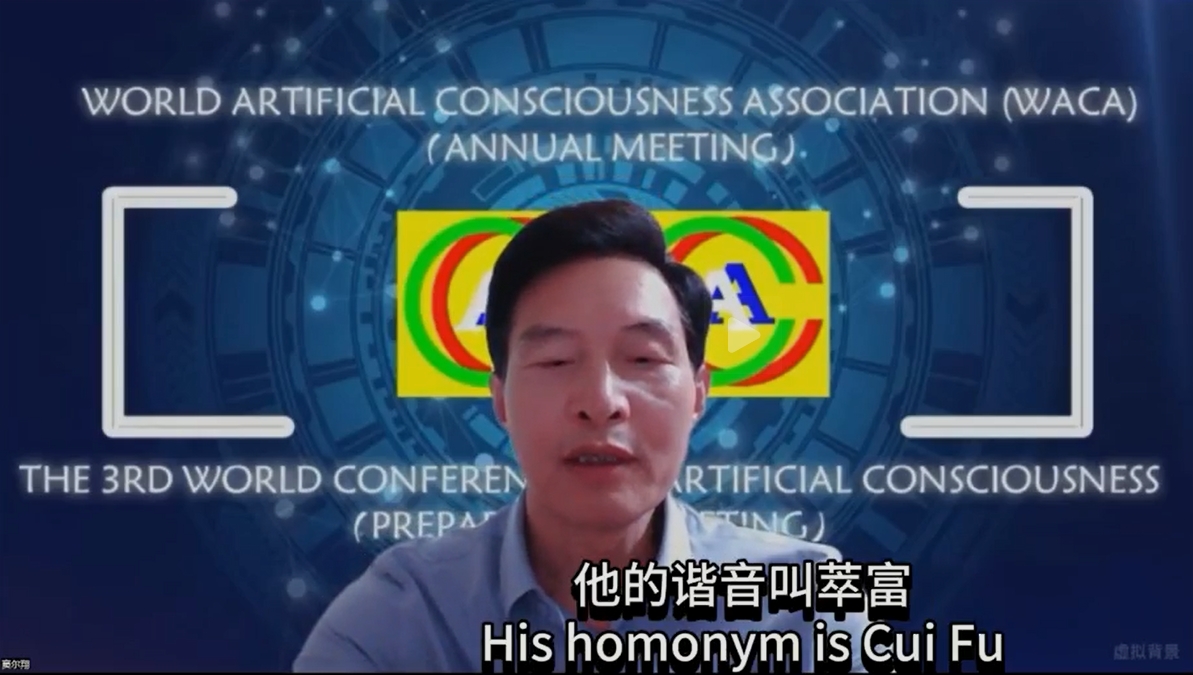
Professor Erxiang Dou, in his speech, proposed that artificial consciousness is driving a new paradigm in human civilization, which requires the construction of an appropriate foundation for economic and social governance. He introduced his theory of “Tri-Fairism” (TRIF)—an approach developed through research in digital economic finance, positioned between government and market forces, and aiming for fairness, justice, and the dual objectives of extracting wealth and generating well-being. TRIF is deeply integrated with the DIKWP cognitive model and is designed to address the core issues of releasing creativity and anchoring human welfare during the development of machine consciousness. He emphasized that during the cognitive leaps enabled by the DIKWP model, the TRIF framework should be used to tackle crises of economic fairness (such as preventing algorithmic hegemony) and challenges to consciousness sovereignty (such as constraining the capitalization of neural data). He called on the preparatory committee to promote the development of DIKWP-TRIF tools—capable of quantifying the technical, institutional, and financial attributes of related projects—and to initiate the drafting of global governance principles for the consciousness economy, including defining property rights over neural data. He concluded with well wishes for the success of the annual meeting and the upcoming Third World Artificial Consciousness Congress.
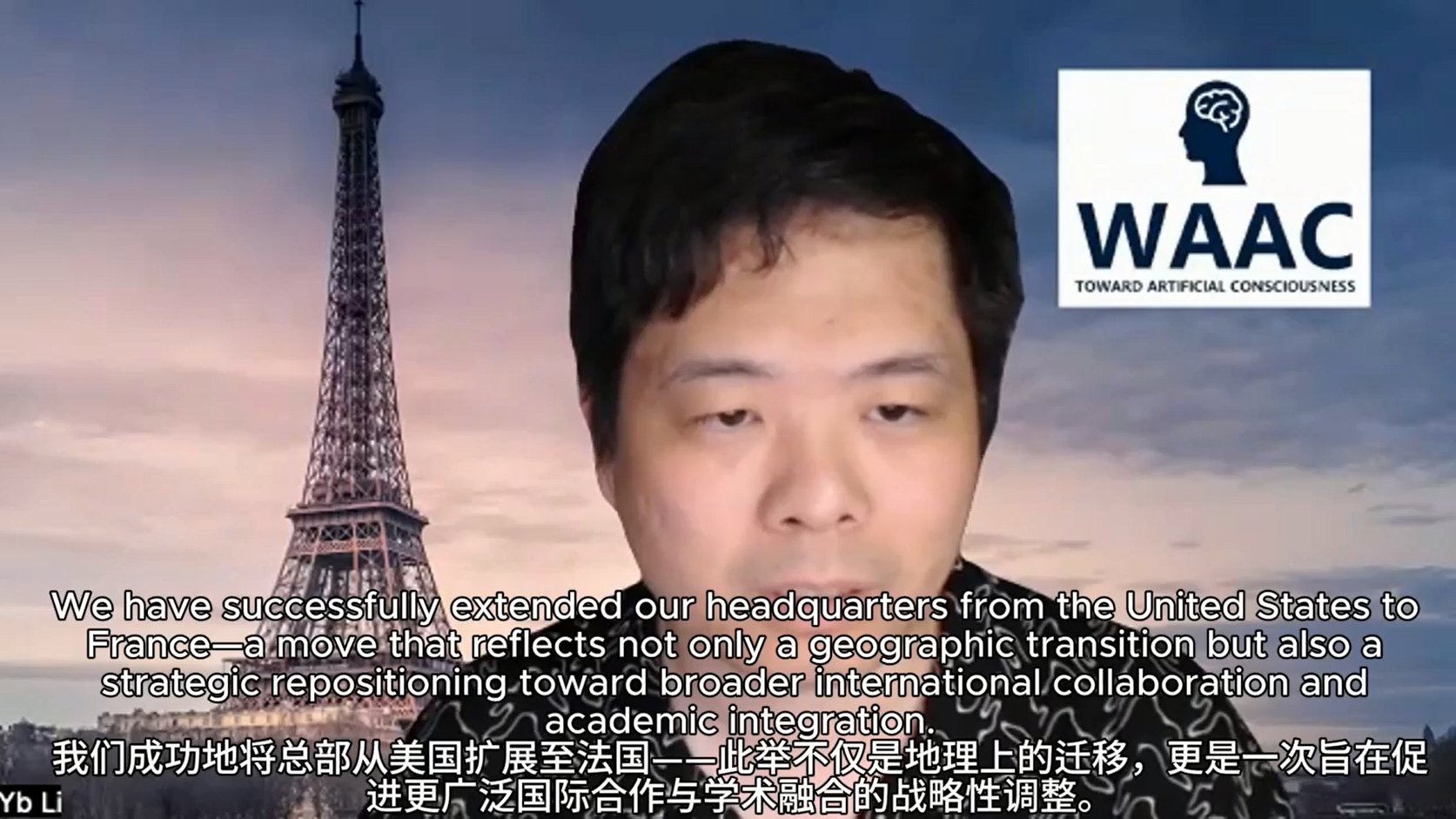
Dr. Yingbo Li, Secretary-General of the World Academy of Artificial Consciousness (WAAC), stated in his address that over the past year, WAAC has expanded its headquarters from the United States to France—a strategic move aimed at fostering broader international collaboration and academic integration. Seven specialized committees have already been established, and he proposed the addition of two more to address interdisciplinary challenges. He emphasized that WAAC’s core research focuses on the DIKWP model, which guides both theoretical inquiry and practical application across various interdisciplinary domains, including proactive medicine and law. He expressed gratitude to the World Artificial Consciousness Association for awarding him the DIKWP International Cooperation Award, describing it as recognition of collective efforts. He reaffirmed WAAC’s commitment to advancing global academic exchange and promoting responsible cross-cultural development in the field. Looking ahead, he stated that WAAC will continue to uphold values of openness and serve as a global platform to support the creation of a scientifically grounded and ethically regulated vision for artificial consciousness.
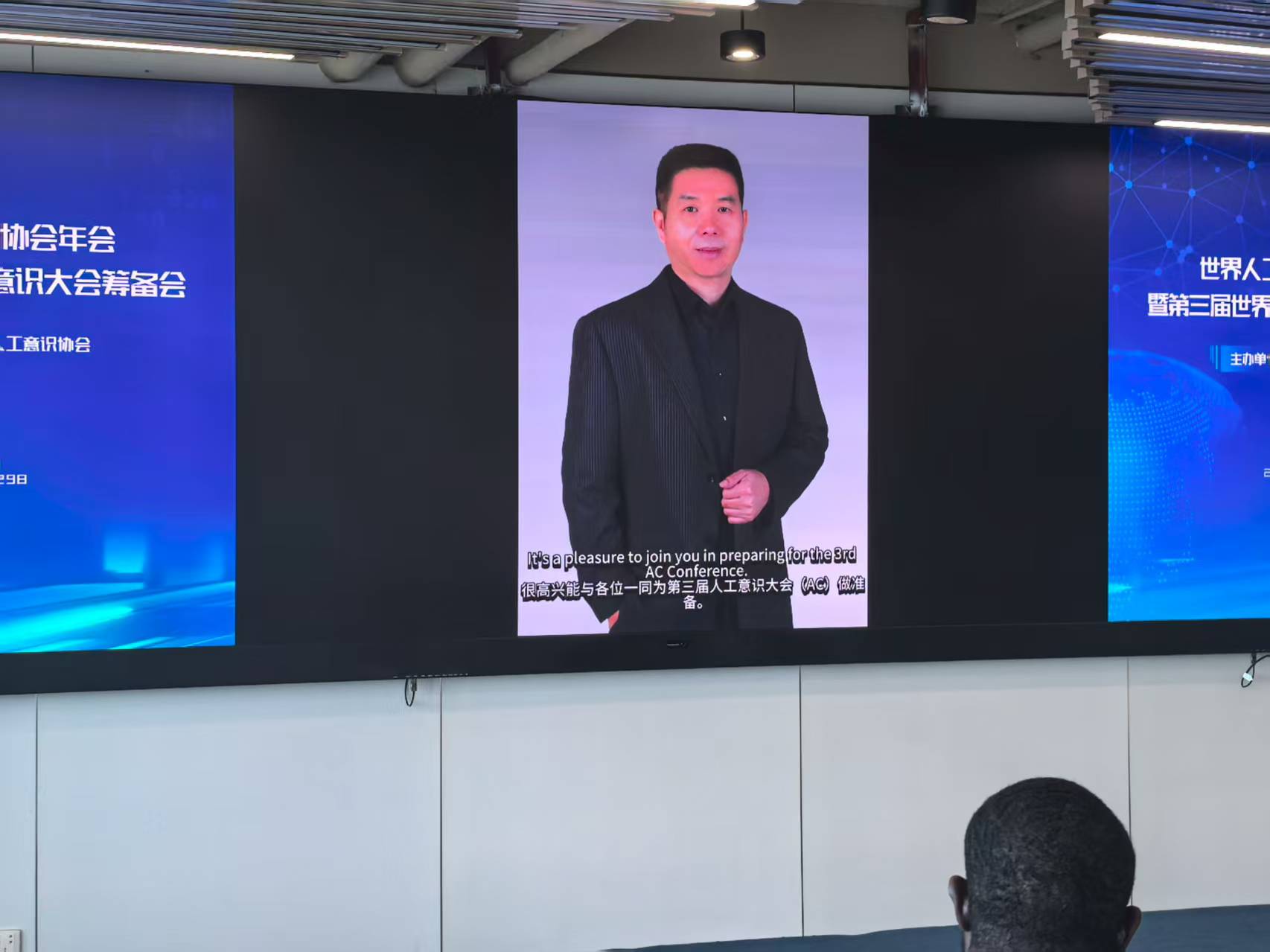
Prof. Huaping Wang expressed his agreement with the conference's theme of placing ethical reflection at the core of technological development. He emphasized that artificial consciousness is not merely an engineering problem, but one that compels humanity to rethink the meaning of consciousness, agency, and responsibility. These complex questions, he said, must be addressed through clear concepts and a normative worldview. He expressed hope that the Third World Artificial Consciousness Congress will continue to support interdisciplinary dialogue, showcasing technological progress while also delving into its underlying philosophical and ethical foundations. He stressed that standardization and governance must be based on a clear understanding of the nature of artificial consciousness in order to build systems that are not only intelligent but also justifiable.
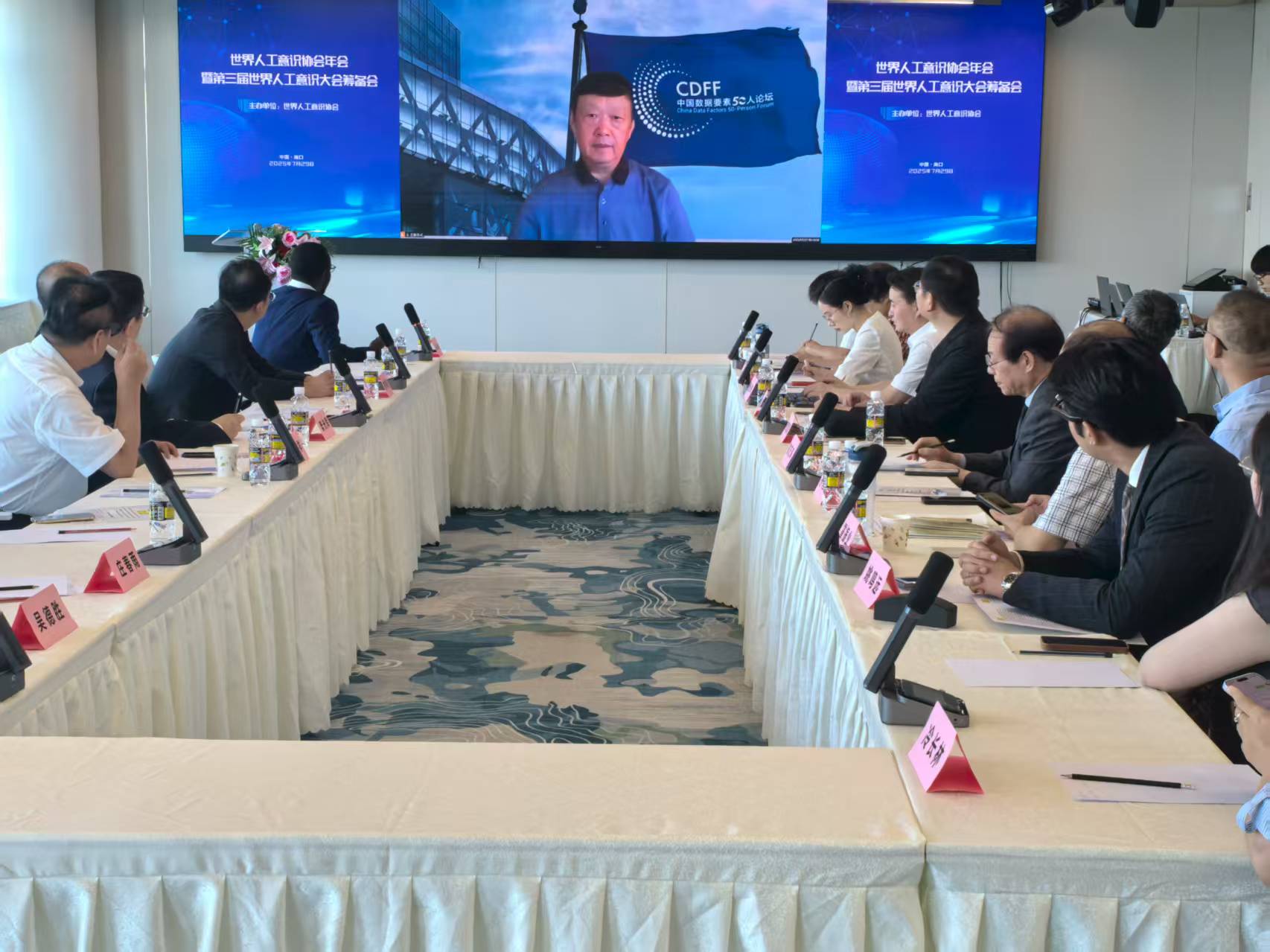
Prof. Chunhui Wang delivered a speech titled “From Large Models to World Models.” He pointed out that since the release of ChatGPT at the end of 2022, generative AI has branched into two main areas: large language models (LLMs) and world models. LLMs rely on one-dimensional representation based on text sequences, while multimodal models still suffer from issues such as "hallucinations." In contrast, world models are built upon understanding the laws of the physical world, moving toward three-dimensional digital spaces. Their essence lies in predicting changes in the physical world, which is foundational for the development of embodied intelligence. He argued that achieving Artificial General Intelligence (AGI) hinges on enabling intelligence to comprehend physical laws. AI agents must align with human values and operate within authorized boundaries. He recommended that the Artificial Consciousness Association conduct research into areas such as the neural mechanisms of consciousness, affective computing, AGI, and the integration of ethics and philosophy to ensure that AI development remains aligned with human interests.
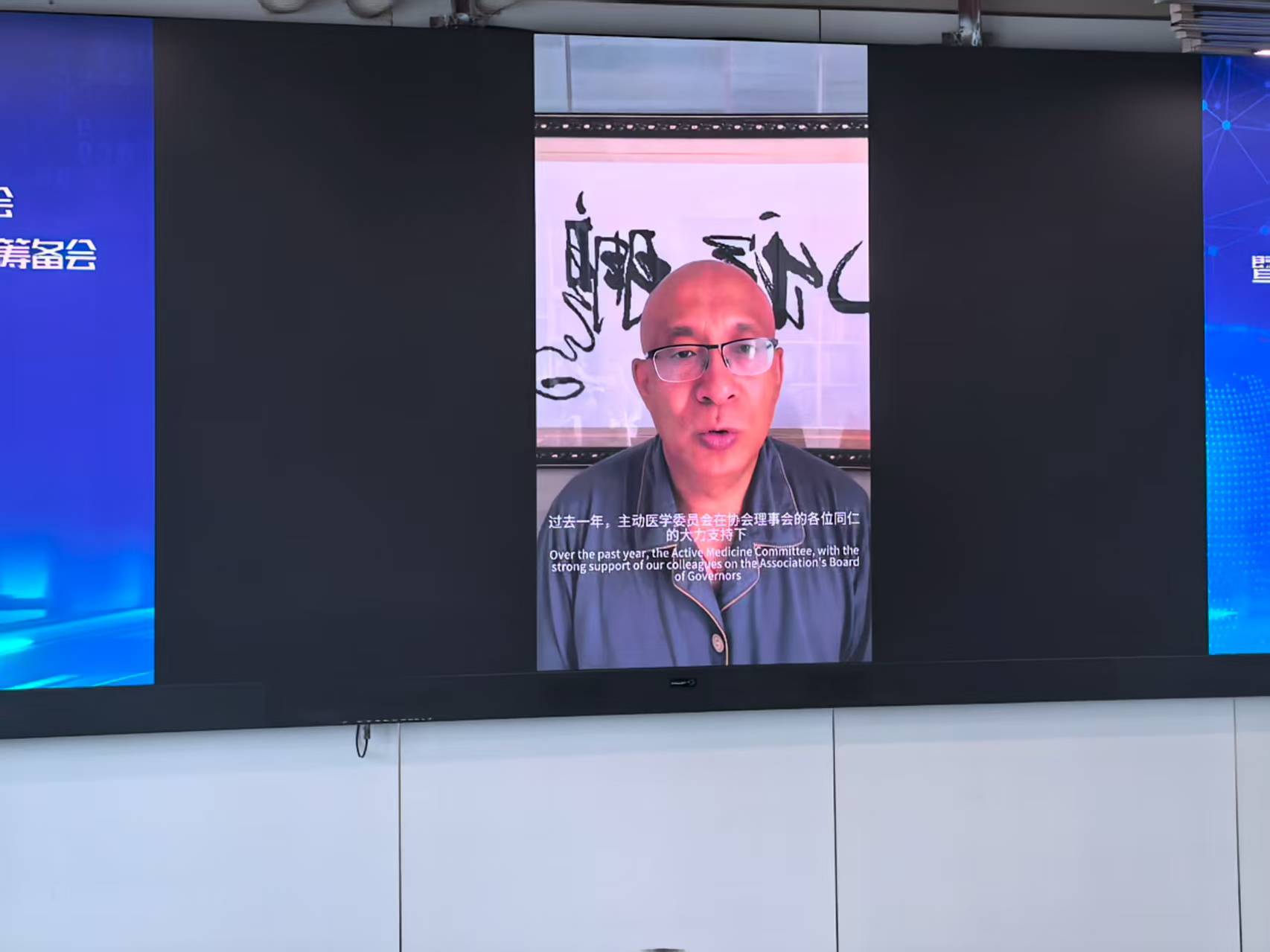
Academician Xiao Zhang stated that over the past year, with the support of the Association, the committee has carried out effective work focusing on the integration of artificial consciousness with proactive medicine, medical informatization, artificial intelligence, and big data. These efforts have promoted the transformation of the proactive medicine concept from theory to application and achieved significant progress in medical informatization and intelligent diagnosis and treatment, thereby providing technological support for personalized and intelligent healthcare. As a scholar in this field, he believes that the integration of artificial consciousness with cutting-edge technologies is a key pathway for the proactive transformation of the healthcare system. Looking ahead, the committee will continue to drive technological innovation, develop intelligent diagnostic and treatment platforms, and promote international standardization. He also emphasized the importance of strengthening global interdisciplinary cooperation to address ethical governance challenges and stated that proactive medicine requires both technological support and an ethical framework aligned with human interests.
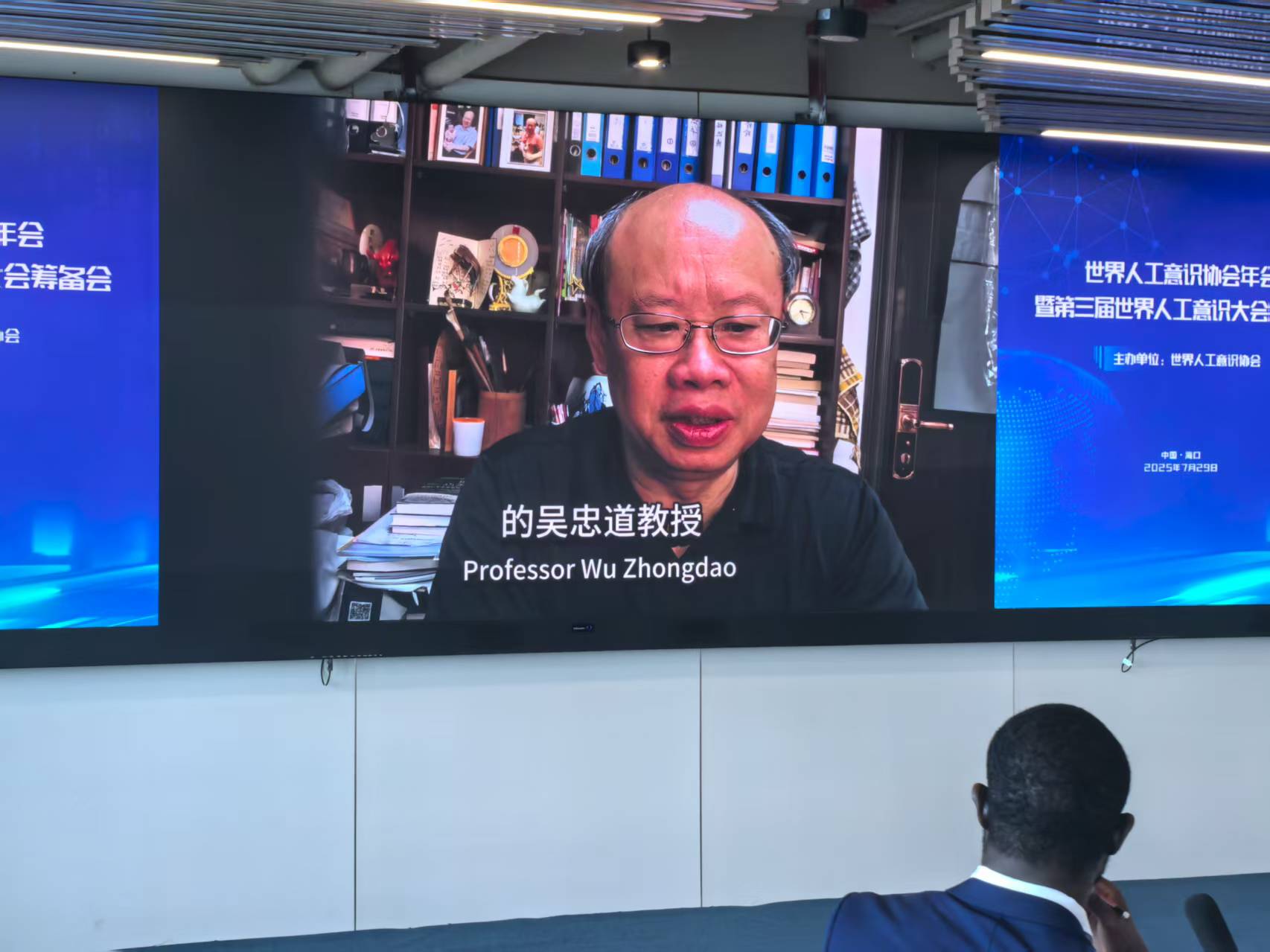
Prof. Zhongdao Wu from Sun Yat-sen University’s Zhongshan School of Medicine remarked that proactive medicine, powered by AI technologies, is reshaping the paradigm of health management—shifting from disease treatment to risk prediction and from experience-based decisions to data-driven strategies. This transformation injects new momentum into the high-quality development of China’s healthcare system and provides a more precise path toward realizing the Healthy China vision. He noted that the development of medicine has entered a new phase that requires interdisciplinary integration.
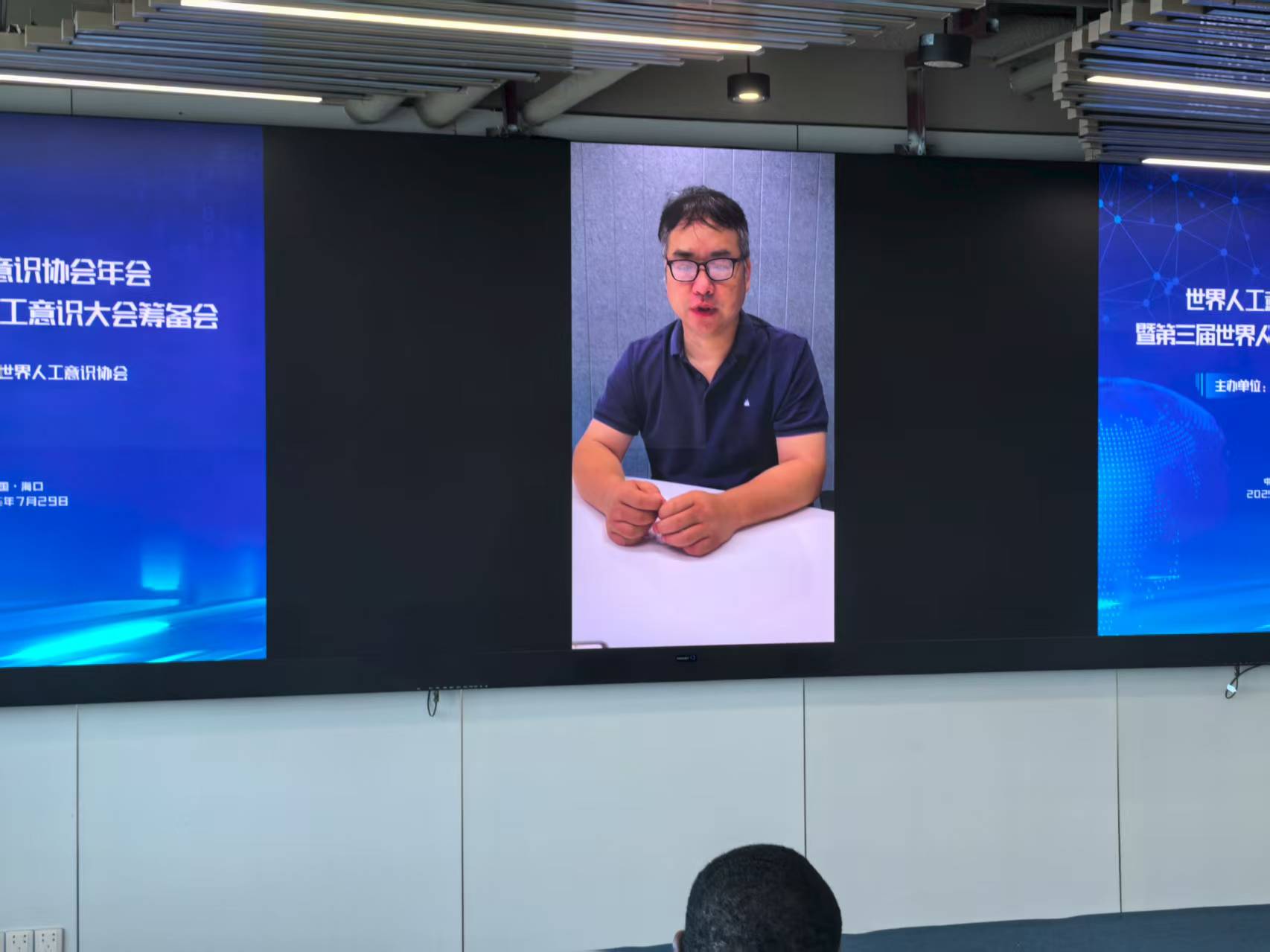
Dr. Haoyang Che from Zeekr stated that artificial consciousness is a cutting-edge research topic, and the DIKWP theory proposed by Academician Yuchong Duan provides an innovative framework for constructing artificial consciousness. With the widespread emergence of new computational paradigms such as liquid neural networks and spiking neural networks, along with the gradual maturity of brain-computer interface technologies, he believes the field of artificial consciousness is poised for revolutionary breakthroughs—and he eagerly anticipates what’s to come.
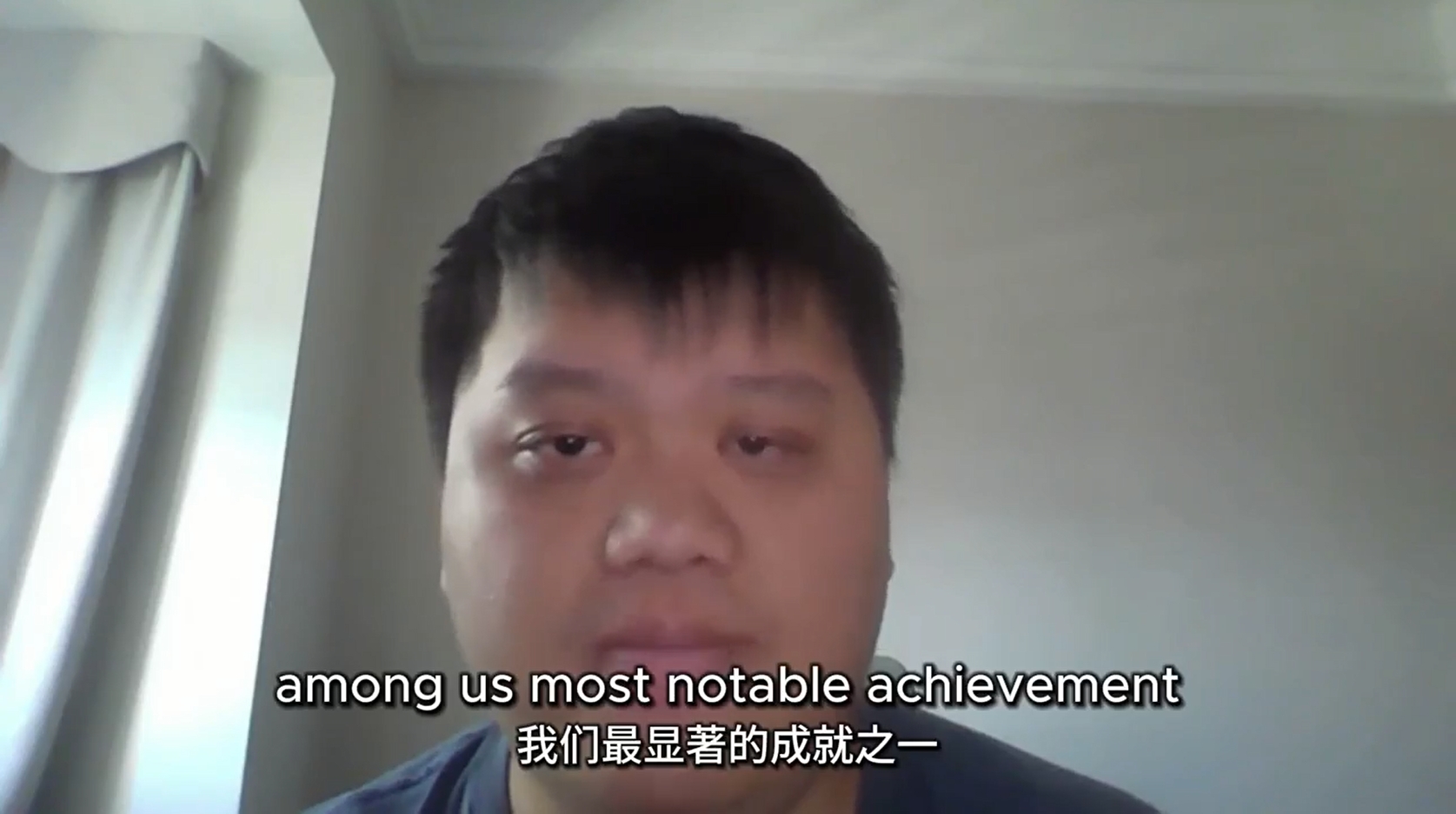
Dr. Kunguang Wu, one of the secretaries of the International Standardization Committee for AI DIKWP Evaluation, summarized the committee’s work on behalf of the team. He noted that significant progress was made in advancing the DIKWP strategy and practical framework based on artificial consciousness. One of the most notable achievements was the official release of 10 benchmark standards for evaluating artificial consciousness. These standards cover key areas such as concepts, DIKWP under semantics, mathematics, systems, assessment testing, creativity hallucination, safety, debate, art, and emotion. This milestone represents a major collaborative effort and marks a critical step in defining evaluation protocols. He expressed gratitude to the committee members for their support and shared that his involvement in tasks such as meeting coordination and document preparation deepened his appreciation for teamwork and the importance of standardization. Looking ahead, he hopes to further develop his professional capabilities, enhance administrative efficiency, and explore new rules to support academic innovation.
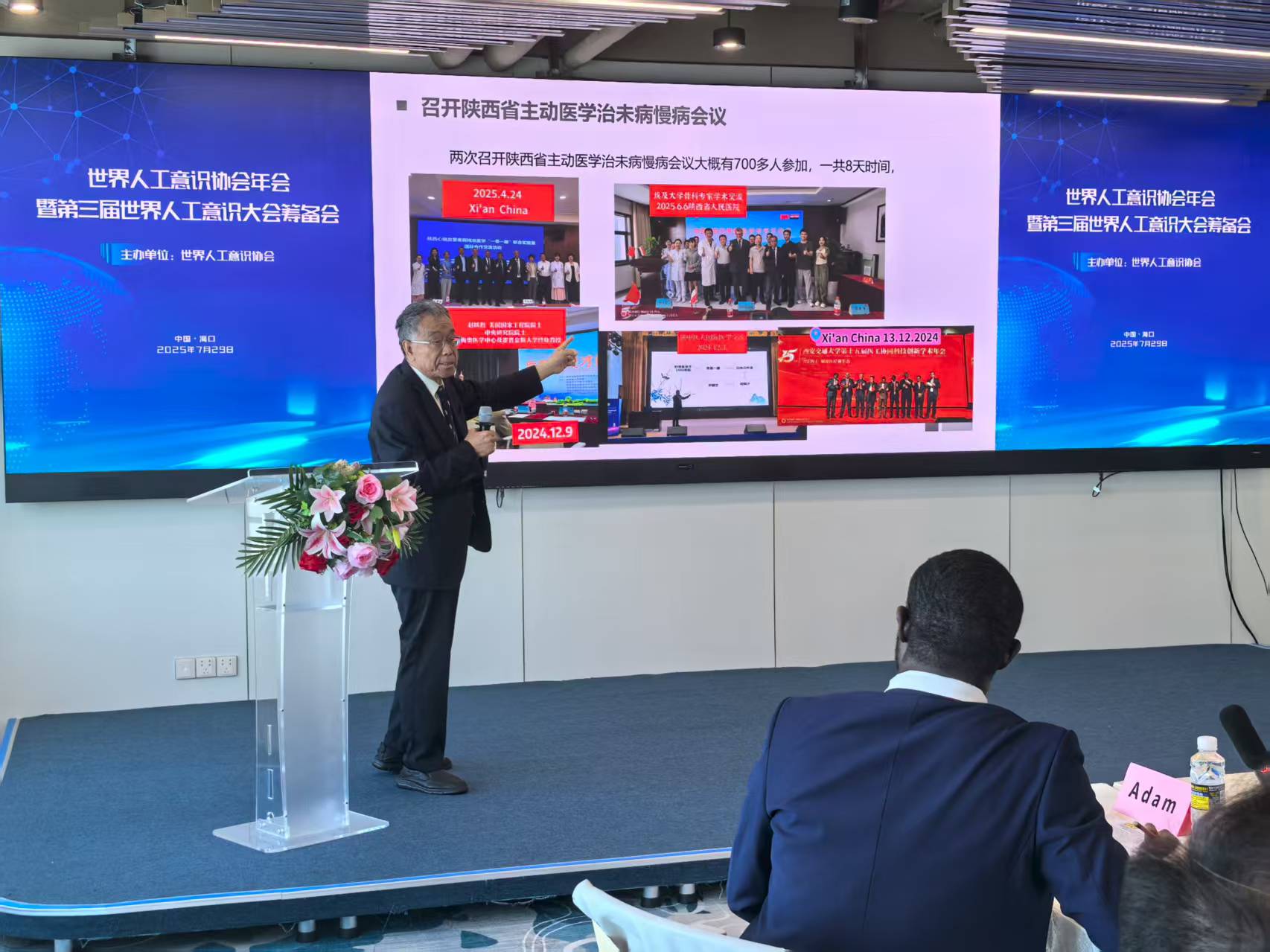
Annual Work Summary of the Proactive Medicine Committee (Chair: Prof. Fuyong Jiao)
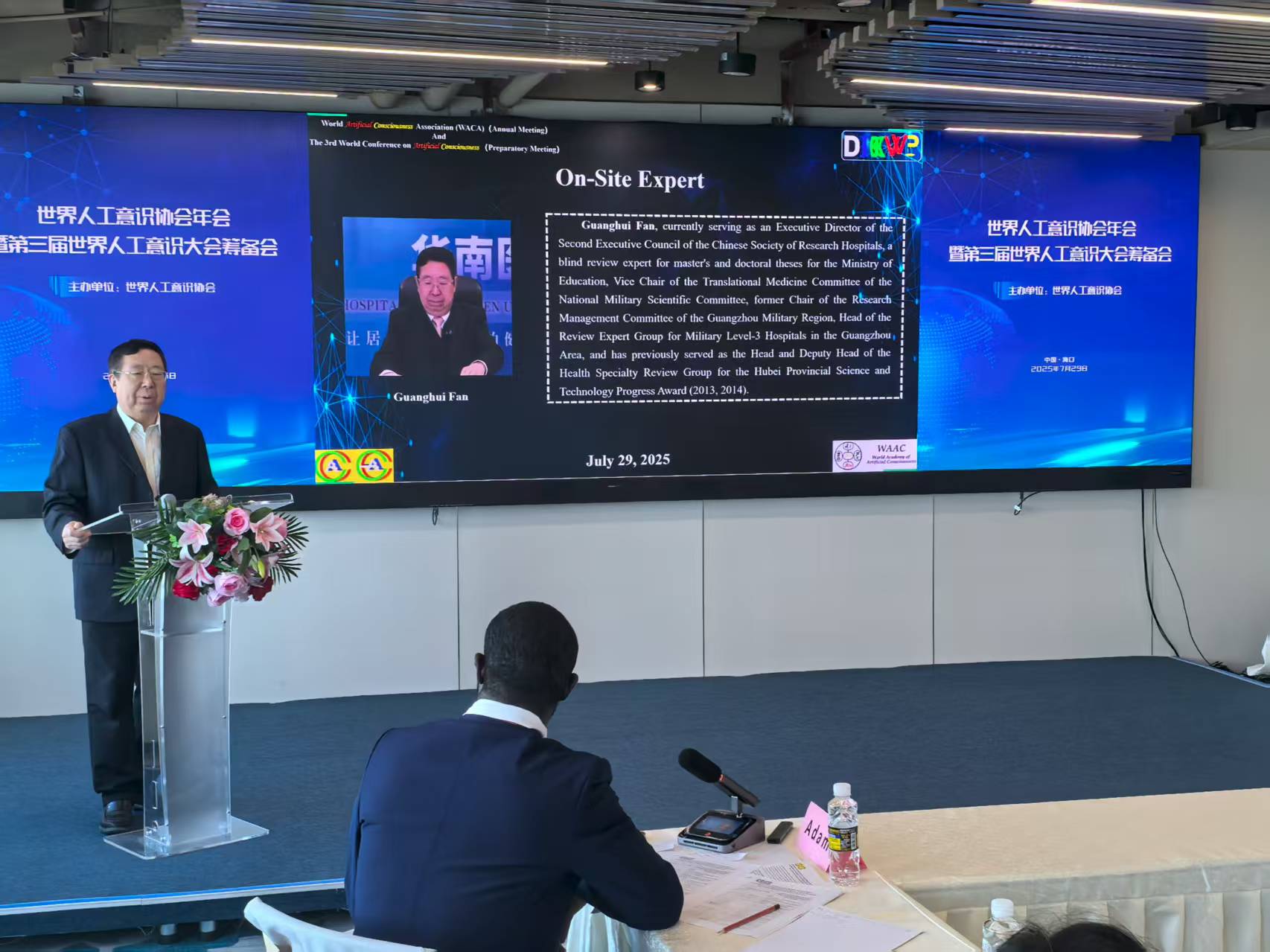
Annual Work Summary of the Proactive Medicine Committee (Chair: Prof. Guanghui Fan)
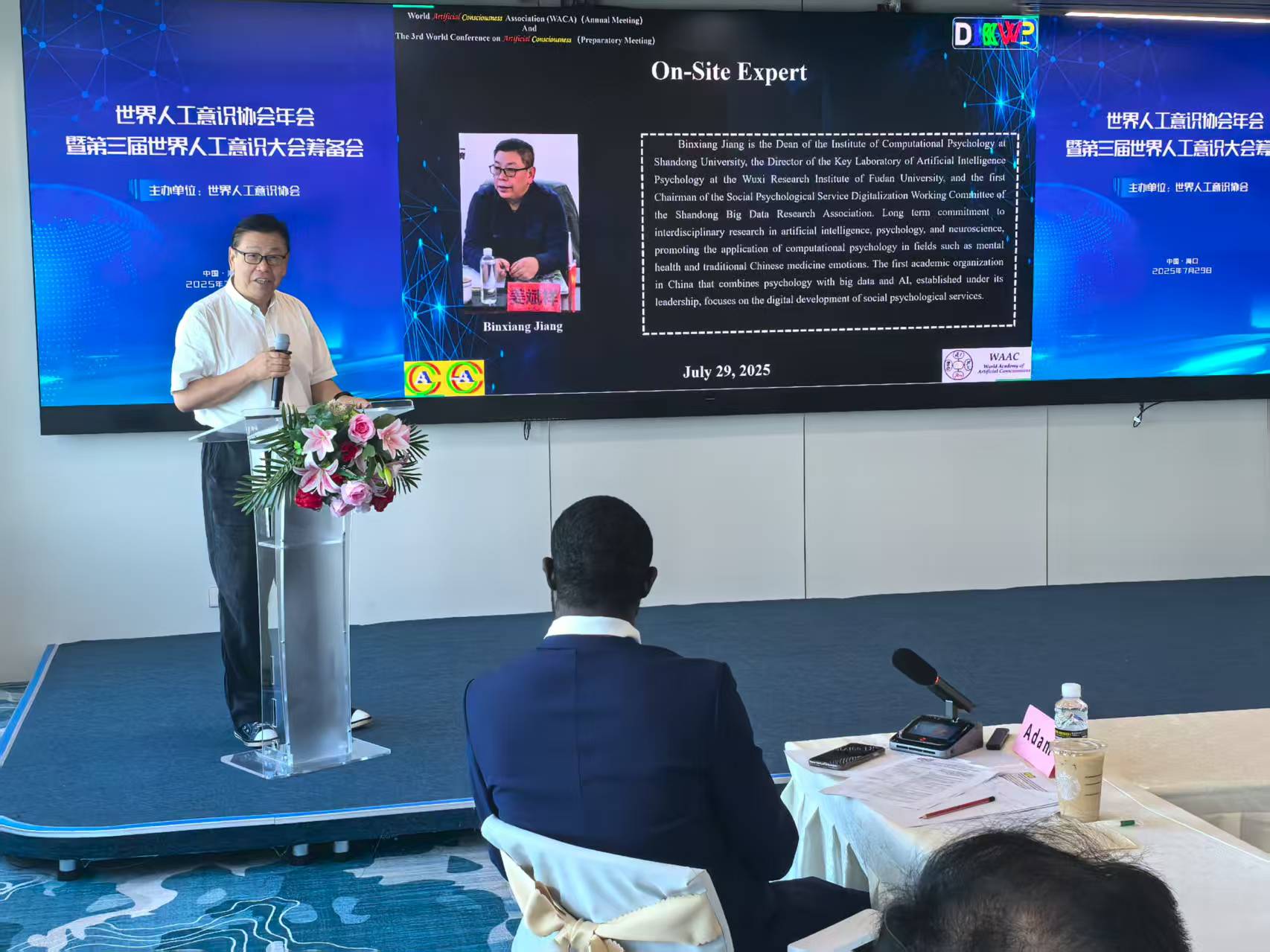
Annual Work Summary of the Committee on Computational Psychology and Cognitive Science (Chair: Prof. Binxiang Jiang)
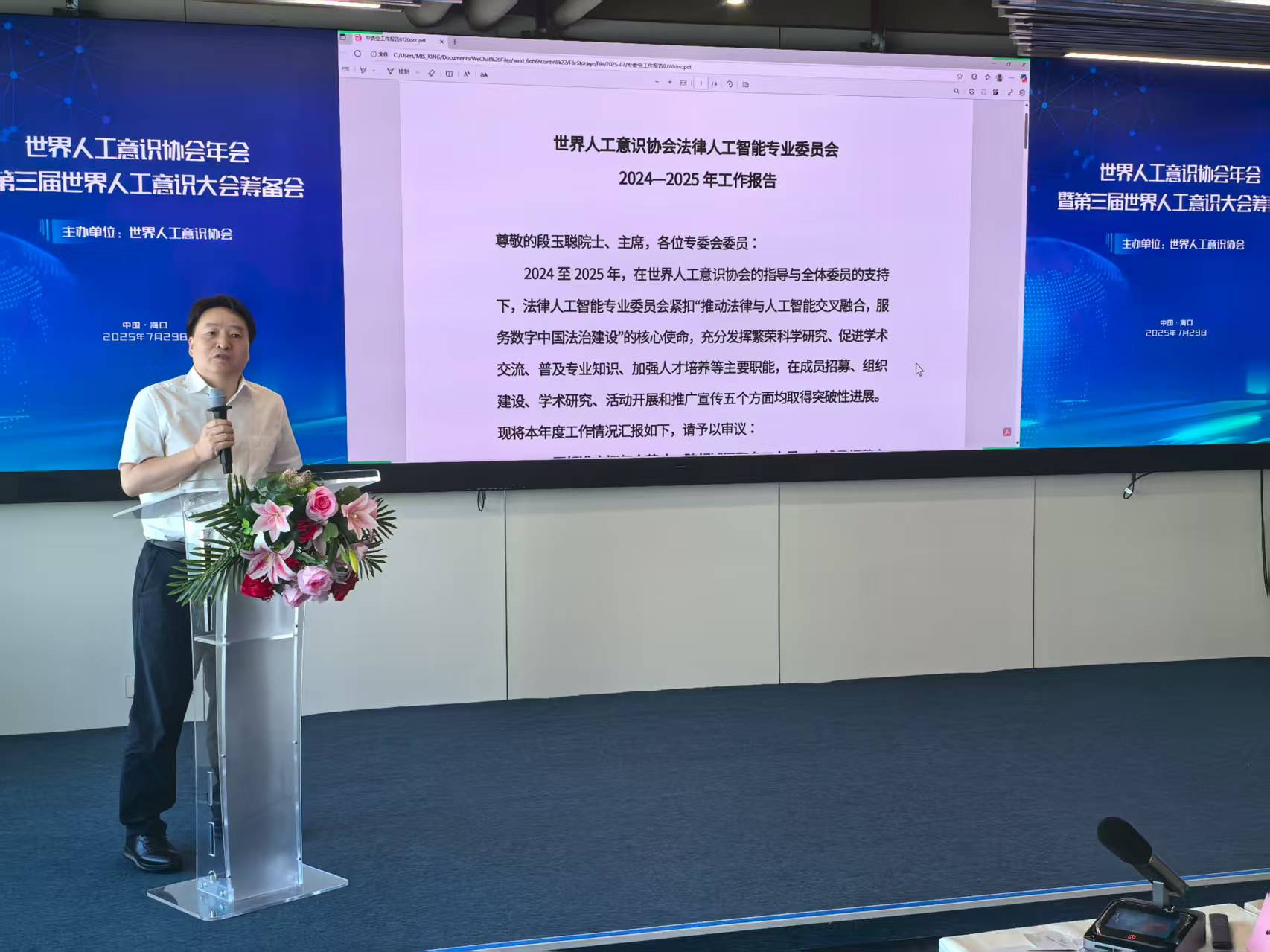
Annual Work Summary of the Committee on AI and Legal Studies (Chair: Prof. Quanlai Cao)
The conference officially announced the establishment of two new committees: the Artificial Consciousness Economics Committee (chaired by Prof. Danxia Xie) and the Artificial Consciousness Robotics Committee (chaired by Prof. Xudong Sun), injecting new momentum into the development of the Association.
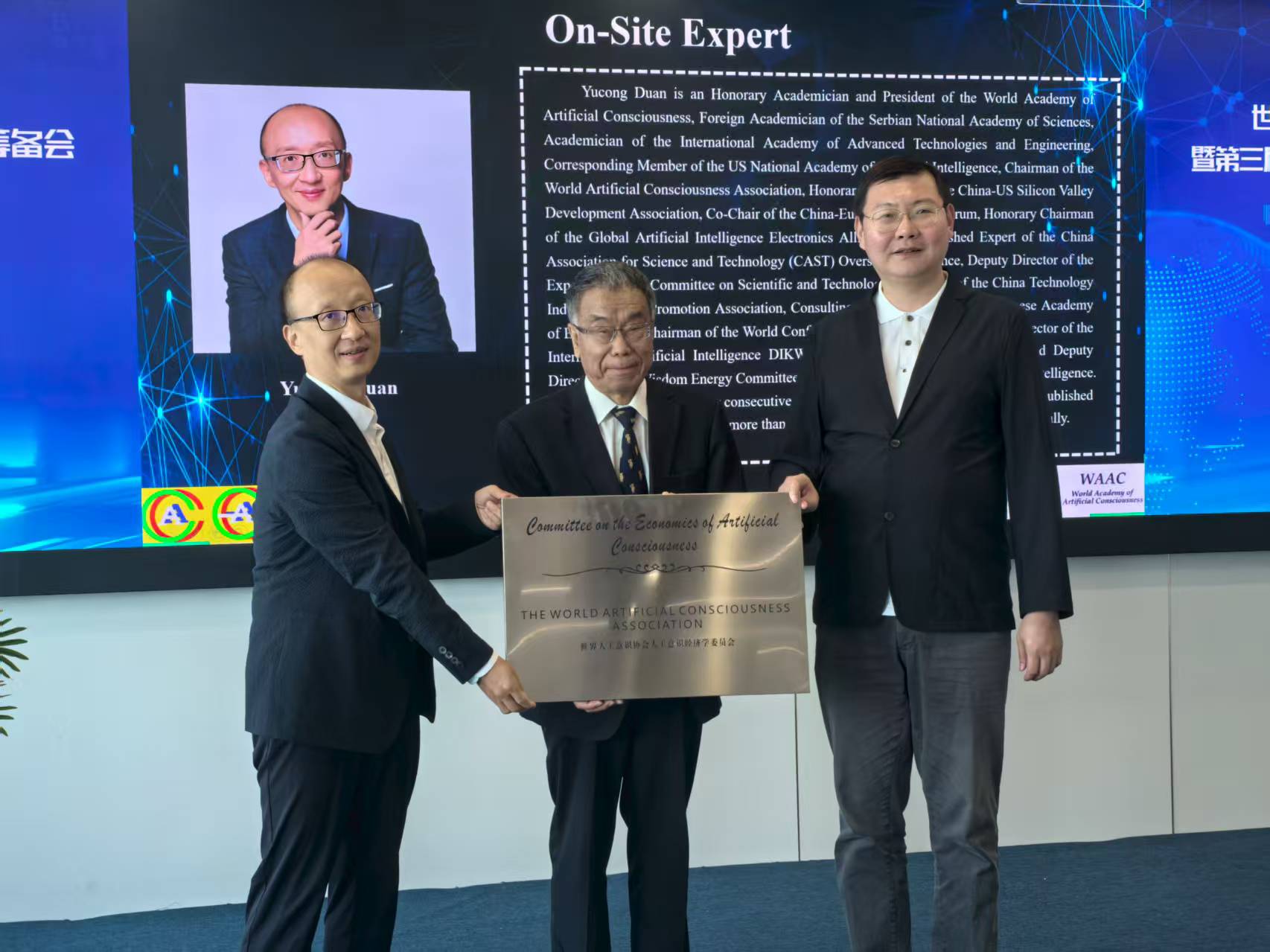
Establishment of the Artificial Consciousness Economics Committee (Chair: Prof. Danxia Xie)
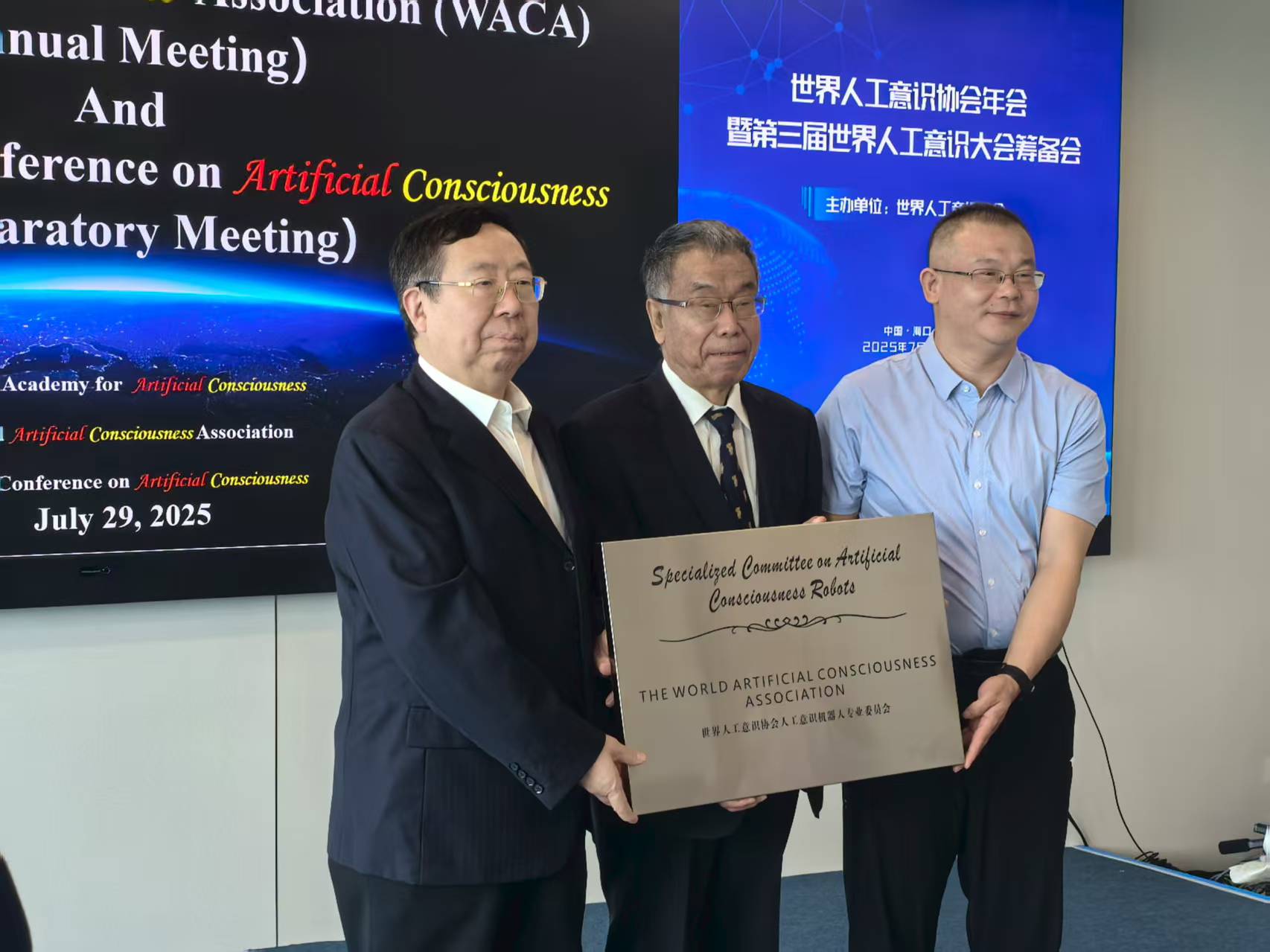
Establishment of the Artificial Consciousness Robotics Committee (Chair: Prof. Xudong Sun)

DIKWP-Proactive Medicine Leadership Award: Academician Fuyong Jiao

DIKWP-Proactive Medicine Outstanding Contribution Award: Academician Guanghui Fan

DIKWP-Proactive Medicine Health Award

DIKWP-Computational Psychology Award: Prof. Binxiang Jiang

DIKWP-Artificial Consciousness Economics Award

DIKWP-Proactive Medicine Integration of Chinese and Western Medicine Award

DIKWP-Artificial Consciousness Economics Award

DIKWP-Semantic Sovereignty Award

DIKWP-TRIZ Innovation Method Award

DIKWP-International Cooperation Award

DIKWP-International Cooperation Award

DIKWP-Robot Innovation Award

DIKWP-Brain-Inspired Computing Award

DIKWP-Social Contribution Award

Best Partner Award

Best Partner Award

The conference concluded that artificial consciousness technology is profoundly shaping the future of human society. In the face of this significant opportunity and challenge, governments, research institutions, industries, and all sectors of society around the world must strengthen open collaboration and dialogue. Together, we must build a trustworthy, controllable, and secure innovation ecosystem for artificial consciousness—one that truly benefits the well-being of all humanity—and jointly embrace the limitless possibilities brought by technological advancement.
1.DIKWP-Proactive Medicine Leadership Award: Prof. Fuyong Jiao
2.DIKWP-Proactive Medicine Outstanding Contribution Award: Guanghui Fan
3.DIKWP-Proactive Medicine Health Award: Prof.Chongpu Yao, Prof.Wantao Chen
4.DIKWP-Computational Psychology Award: Prof.Binxiang Jiang
5.DIKWP-Artificial Consciousness Economics Award: Prof.Danxia Xie, Prof.Desheng Wu
6.DIKWP-Proactive Medicine Integration of Chinese and Western Medicine Award: Prof. Yu Feng, Prof. Yuanhui Fu
7.DIKWP-Semantic Blockchain Award: Prof. Lizhong Li
8.DIKWP-Love and Compassion Award: Prof. Xiaoping Guo
9.DIKWP-Proactive Medicine Diagnostics Award: Prof. Hongjun Li
10.DIKWP-Proactive Medicine Practice Award: Prof. Chiying An
11.DIKWP-Semantic Sovereignty Award: Prof. Juan Xu, Prof. Long Han, Prof. Weidong Ji
12.DIKWP-Standardization Award: Prof. James Ong, Zhifang Pan, Ziye Yan
13.DIKWP-TRIZ Award: Prof. Kunguang Wu, Prof. Xiaojun Yan
14.DIKWP-Philosophy Award:
Prof. Hengjin Cai
Prof. Hengwei Li
Prof. Huaping Wang
Prof. Yongmou Liu
15.DIKWP-Awareness, Ethics, and Safety Award: Prof. Hui Li
16.DIKWP-Human-Computer Interaction Award: Prof. Changlin Leng
17.DIKWP-Intelligent Transportation Award: Prof. Haoyang Che, Prof. Zhendong Xie
18.DIKWP-International Cooperation Award: 26 people from 23 countries
·Prof. Ahmed Almousa (Germany)
·Prof. Aleksey A. Gusev (Russia)
·Dr. Alhaji Adam Abubakari (Ghana)
·Prof. Begench Annayev (Turkmenistan)
·Prof. Burenjargal Tsgjavkhlan (Mongolia)
·Prof. Carlo Catassi (Italy)
·Prof. Chang-Keun Kim (South Korea)
·Prof. Fiaz Ahmad (Pakistan)
·Fuad Hajiyev (Azerbaijan)
·Hongyang Liu (South Korea)
·Prof. Jan Hovorka (Czech Republic)
·Prof. Khikmat Anvarv (Uzbekistan)
·Prof. Larissa Gorbach (Belarus)
·Prof. Laziz Niyazov (Uzbekistan)
·Prof. Le Hong Nhung (Vietnam)
·Prof. Mohamad Jamal (Egypt)
·Prof. Nazarzoda Faridun (Tajikistan)
·Prof. Nguyen Quang Binh (Vietnam)
·Prof. Rahim Firouzi Bostanabad (Iran)
·Prof. Ram Hari Chapagain (Nepal)
·Prof. Sajid Anwar (Pakistan)
·Prof. Santosh Adhikaril (Nepal)
·Prof. Senthil Arun Kumar (India)
·Prof. Tungalag Osgonbaatar (Mongolia)
·Prof. Vesna Stojanovic (Serbia)
·Prof. Yingbo Li (France)
·Prof. Yunhai Dai (South Korea)
·Dr. Zafar Ali Choudry (Pakistan)
19.DIKWP-Robot Innovation Award: Shengtao Song
20.DIKWP-Brain-Inspired Computing Award
Chaoyang Ai
Di Zhao
Jiajia Yang
Li Xiao
Zhen Liu
21.DIKWP-Art and Design Award: Prof. He Wang, Prof. Xiaodong Tan, Prof. Yue'en Li
22.DIKWP-Quantum Artificial Consciousness Award: Prof. Xiangqun Chen
23.Best Paper Award:The Large Language Model (LLM) Bias Evaluation (Age Bias)
24.DIKWP-Social Contribution Award:
Anjun Jin
Bin Zhang
Erxiang Dou
Guohui Jiang
Hongjian Liu
Huailiang Feng
Jin Yu
Jinyun Yuan
Lei Yan
Lei Yu
Licheng Jiao
Linhua Jiang
Qinghua Xia
Quanguo Zhang
Quanlai Cao
Stephen L. Ternyik
Wei Liu
Weimin Zheng
Wenjie Huang
Xian Jin
Yigang He
25.Best Book Award:
Artificial Consciousness and Human Consciousness
Artificial Consciousness Diary
Artificial Intelligence General Knowledge
Frontier of International Research on Kawasaki Disease
Fundamentals of Active Medicine: Introductory Level
Introduction to Artificial Consciousness
Mastering DeepSeek
26.Best Partner Award:
China Europe Scientists Forum
China Society for the Promotion of Science and Technology Commercialization
China&USA Silicon Valley Development Association
EUROCENTER TCM
International Academician and Expert Alliance
International Artificial Intelligence Association
International Data Association
Nobel Laureate Institute of Life Sciences
Serbian National Academy of Sciences
United Nations World Silk Road Forum Digital Economy Research Institute
Ya Kere/TradeShere Health Care & Medical Exchange Association, Ghana



Series of Expert Speeches
The event was hosted by Dr. Alhaji Adam Abubakari and featured the presence of numerous distinguished academic guests from both China and abroad. Academicians Qinxi Dong, Zhen Liu, Hengjin Cai, Aikebai’er Yilahon, Dongfang Wu, Chunguo Li, Yuanhui Fu, Chongpu Yao, and Hongjun Li, along with President Yu Feng, Prof. Mohamad al-Ashhab, Prof. Erxiang Dou, and Secretary-General Yingbo Li, attended the opening ceremony and delivered speeches.





















Committee Annual Summary
The conference focused on in-depth discussions around the latest topics in the field of artificial consciousness and prospects for future collaboration. Six committees, including the WACA Proactive Medicine Committee (chaired by Prof. Fuyong Jiao), the Committee on Computational Psychology and Cognitive Science (chaired by Prof. Binxiang Jiang), and the Committee on AI and Legal Studies (chaired by Prof. Quanlai Cao), each presented their annual work summaries.

Annual Work Summary of the Proactive Medicine Committee (Chair: Prof. Fuyong Jiao)

Annual Work Summary of the Proactive Medicine Committee (Chair: Prof. Guanghui Fan)

Annual Work Summary of the Committee on Computational Psychology and Cognitive Science (Chair: Prof. Binxiang Jiang)

Annual Work Summary of the Committee on AI and Legal Studies (Chair: Prof. Quanlai Cao)

Establishment of the Artificial Consciousness Economics Committee (Chair: Prof. Danxia Xie)

Establishment of the Artificial Consciousness Robotics Committee (Chair: Prof. Xudong Sun)
Committee Annual Awards Ceremony
The conference featured a grand annual awards ceremony, presenting 23 categories of awards spanning all key fields of artificial consciousness. More than 100 distinguished scholars and institutions from 23 countries were recognized. Highlights include: The DIKWP-Proactive Medicine Leadership Award presented to Academician Fuyong Jiao, The DIKWP-Proactive Medicine Outstanding Contribution Award presented to Academician Guanghui Fan, The DIKWP-Proactive Medicine Health Award presented to Prof. Wantao Chen, The DIKWP-Computational Psychology Award to Prof. Binxiang Jiang, The DIKWP-Artificial Consciousness Economics Award to Prof. Danxia Xie, The DIKWP-International Cooperation Award jointly awarded to 26 scholars from 23 countries across four continents, including Prof. Ahmed Almousa (Germany). Dr. Alhaji Adam Abubakari (Ghana), among others. Other prestigious awards such as the DIKWP-TRIZ Award, Semantic Sovereignty Award, Standardization Award, and Best Partner Award were presented to leading domestic and international scholars in recognition of their contributions to interdisciplinary research in related fields.

DIKWP-Proactive Medicine Leadership Award: Academician Fuyong Jiao

DIKWP-Proactive Medicine Outstanding Contribution Award: Academician Guanghui Fan

DIKWP-Proactive Medicine Health Award

DIKWP-Computational Psychology Award: Prof. Binxiang Jiang

DIKWP-Artificial Consciousness Economics Award

DIKWP-Proactive Medicine Integration of Chinese and Western Medicine Award

DIKWP-Artificial Consciousness Economics Award

DIKWP-Semantic Sovereignty Award

DIKWP-TRIZ Innovation Method Award

DIKWP-International Cooperation Award

DIKWP-International Cooperation Award

DIKWP-Robot Innovation Award

DIKWP-Brain-Inspired Computing Award

DIKWP-Social Contribution Award

Best Partner Award

Best Partner Award
Revision of the Constitution of the World Artificial Consciousness Association
The conference reviewed and approved the revised Constitution of the World Artificial Consciousness Association, establishing a more robust organizational structure that lays a solid institutional foundation for future development. It was also officially announced that the Third World Artificial Consciousness Congress will be held in the second half of 2025 in the Greater Bay Area, marking the first time the event will take place on a large scale in an offline format. This is expected to greatly enhance face-to-face interaction and collaboration among scholars worldwide.
Participants reached significant consensus on several key initiatives: Jointly building a development framework for Proactive Medicine. Promoting global application of the DIKWP White-Box Evaluation Standard. Strengthening international cooperation mechanisms. Advancing responsible innovation in artificial intelligence and artificial consciousness.
Progress in the Development of the World Academy of Artificial Consciousness (WAAC)
The conference also announced the latest developments in the construction of the World Academy of Artificial Consciousness (WAAC). The academy aims to bring together global intellectual resources to lead cutting-edge research in artificial consciousness, formulate ethical and safety standards, and cultivate international talent. During the roundtable sessions, scholars from various countries engaged in deep and lively discussions on critical topics such as: Implementation pathways for sovereign AI. Technical frameworks for semantic sovereignty. Clinical translation in proactive medicine.

List of Award Winners
1.DIKWP-Proactive Medicine Leadership Award: Prof. Fuyong Jiao
2.DIKWP-Proactive Medicine Outstanding Contribution Award: Guanghui Fan
3.DIKWP-Proactive Medicine Health Award: Prof.Chongpu Yao, Prof.Wantao Chen
4.DIKWP-Computational Psychology Award: Prof.Binxiang Jiang
5.DIKWP-Artificial Consciousness Economics Award: Prof.Danxia Xie, Prof.Desheng Wu
6.DIKWP-Proactive Medicine Integration of Chinese and Western Medicine Award: Prof. Yu Feng, Prof. Yuanhui Fu
7.DIKWP-Semantic Blockchain Award: Prof. Lizhong Li
8.DIKWP-Love and Compassion Award: Prof. Xiaoping Guo
9.DIKWP-Proactive Medicine Diagnostics Award: Prof. Hongjun Li
10.DIKWP-Proactive Medicine Practice Award: Prof. Chiying An
11.DIKWP-Semantic Sovereignty Award: Prof. Juan Xu, Prof. Long Han, Prof. Weidong Ji
12.DIKWP-Standardization Award: Prof. James Ong, Zhifang Pan, Ziye Yan
13.DIKWP-TRIZ Award: Prof. Kunguang Wu, Prof. Xiaojun Yan
14.DIKWP-Philosophy Award:
Prof. Hengjin Cai
Prof. Hengwei Li
Prof. Huaping Wang
Prof. Yongmou Liu
15.DIKWP-Awareness, Ethics, and Safety Award: Prof. Hui Li
16.DIKWP-Human-Computer Interaction Award: Prof. Changlin Leng
17.DIKWP-Intelligent Transportation Award: Prof. Haoyang Che, Prof. Zhendong Xie
18.DIKWP-International Cooperation Award: 26 people from 23 countries
·Prof. Ahmed Almousa (Germany)
·Prof. Aleksey A. Gusev (Russia)
·Dr. Alhaji Adam Abubakari (Ghana)
·Prof. Begench Annayev (Turkmenistan)
·Prof. Burenjargal Tsgjavkhlan (Mongolia)
·Prof. Carlo Catassi (Italy)
·Prof. Chang-Keun Kim (South Korea)
·Prof. Fiaz Ahmad (Pakistan)
·Fuad Hajiyev (Azerbaijan)
·Hongyang Liu (South Korea)
·Prof. Jan Hovorka (Czech Republic)
·Prof. Khikmat Anvarv (Uzbekistan)
·Prof. Larissa Gorbach (Belarus)
·Prof. Laziz Niyazov (Uzbekistan)
·Prof. Le Hong Nhung (Vietnam)
·Prof. Mohamad Jamal (Egypt)
·Prof. Nazarzoda Faridun (Tajikistan)
·Prof. Nguyen Quang Binh (Vietnam)
·Prof. Rahim Firouzi Bostanabad (Iran)
·Prof. Ram Hari Chapagain (Nepal)
·Prof. Sajid Anwar (Pakistan)
·Prof. Santosh Adhikaril (Nepal)
·Prof. Senthil Arun Kumar (India)
·Prof. Tungalag Osgonbaatar (Mongolia)
·Prof. Vesna Stojanovic (Serbia)
·Prof. Yingbo Li (France)
·Prof. Yunhai Dai (South Korea)
·Dr. Zafar Ali Choudry (Pakistan)
19.DIKWP-Robot Innovation Award: Shengtao Song
20.DIKWP-Brain-Inspired Computing Award
Chaoyang Ai
Di Zhao
Jiajia Yang
Li Xiao
Zhen Liu
21.DIKWP-Art and Design Award: Prof. He Wang, Prof. Xiaodong Tan, Prof. Yue'en Li
22.DIKWP-Quantum Artificial Consciousness Award: Prof. Xiangqun Chen
23.Best Paper Award:The Large Language Model (LLM) Bias Evaluation (Age Bias)
24.DIKWP-Social Contribution Award:
Anjun Jin
Bin Zhang
Erxiang Dou
Guohui Jiang
Hongjian Liu
Huailiang Feng
Jin Yu
Jinyun Yuan
Lei Yan
Lei Yu
Licheng Jiao
Linhua Jiang
Qinghua Xia
Quanguo Zhang
Quanlai Cao
Stephen L. Ternyik
Wei Liu
Weimin Zheng
Wenjie Huang
Xian Jin
Yigang He
25.Best Book Award:
Artificial Consciousness and Human Consciousness
Artificial Consciousness Diary
Artificial Intelligence General Knowledge
Frontier of International Research on Kawasaki Disease
Fundamentals of Active Medicine: Introductory Level
Introduction to Artificial Consciousness
Mastering DeepSeek
26.Best Partner Award:
China Europe Scientists Forum
China Society for the Promotion of Science and Technology Commercialization
China&USA Silicon Valley Development Association
EUROCENTER TCM
International Academician and Expert Alliance
International Artificial Intelligence Association
International Data Association
Nobel Laureate Institute of Life Sciences
Serbian National Academy of Sciences
United Nations World Silk Road Forum Digital Economy Research Institute
Ya Kere/TradeShere Health Care & Medical Exchange Association, Ghana
Read more
